
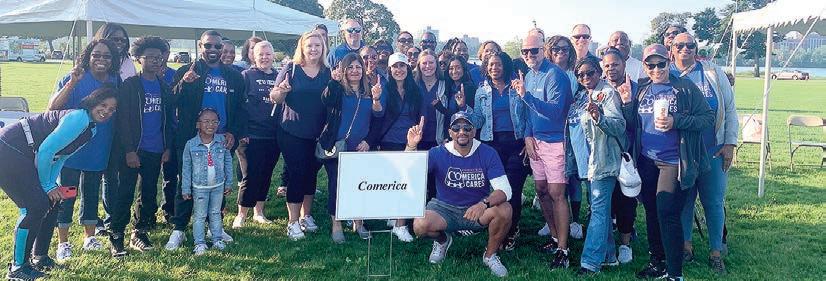





By Sam Robinson SENIOR REPORTER
A number of cities across the country will elect a Black mayor this year and Detroit is one of them.
By Ebony JJ Curry SENIOR REPORTER
America’s two largest cities are currently represented by Black mayors: Los Angeles Mayor Karen Bass, who was elected in 2022 in a decisive victory over billionaire Rick Caruso, and New York City mayor Eric Adams.
Adams, the incumbent, is expected to be defeated later this fall by Democratic Socialist assemblyman Zohran Mamdani in the November general election after Mamdani’s stunning upset victory in the Democratic primary over former Gov. Andrew Cuomo.
By Ebony JJ Curry SENIOR REPORTER
Late Thursday night, Sept. 14, a historic moment unfolded in American labor relations as the United Auto Workers (UAW) union initiated a strike against Ford, General Motors (GM), and Stellantis. For the first time, the union took simultaneous action against all three major Detroit-based automakers. The action involves approximately 13,000 UAW members in assembly plants across Michigan, Ohio, and Missouri, who walked off their jobs after existing labor contracts expired at 11:59 p.m.
IJust two years ago, Black mayors were leading the four largest American cities, when Bass, Adams, Chicago’s former Mayor Lori Lightfoot and former Houston Mayor Sylvester Turner, who passed away earlier this year in March. Chicago elected another Black mayor to replace Lightfoot, Brandon Johnson, in 2023. His victory was propelled by support from Chicago teachers unions. He defeated former public schools CEO Paul Vallas.
n a breathtaking celebration of talent, determination, and the unyielding spirit of Black excellence, the Michigan Chronicle marked its 10th Annual 40 Under 40 event Thursday evening. This year’s soirée, drenched in the theme “All Black Everything with Gold Accents,” transcended expectations and essentially illuminated the golden gems within the true essence of Black excellence. Hosted by the charismatic duo of Andre Ash and Lynzee Mychael from Michigan Chronicle’s Finally Friday, the night was a triumph for the city of Detroit and its vibrant community of young Black professionals.
All four of those cities are “majority minority” cities where Latinos, not Black residents, make up the largest non-white ethnic group. The Hispanic population in the U.S. passed 62 million in 2020, accounting for 19% of all Americans. It’s the country’s second largest racial group, behind White Americans but ahead of Black Americans, according to the U.S. Census Bureau. U.S. born Latinos make up the majority of those in the U.S.

own path to success. Clement “Fame” Brown, the creative mind behind Three Thirteen Detroit’s Brand Name, received the prestigious Entrepreneur of the Year Award. Brown’s commitment to empowering the city through fashion and entrepreneurship has left an indelible mark.
Shortly before midnight on Sept. 14, GM released a statement expressing disappointment with the strike action, despite offering what it termed an “unprecedented economic package” that included historic wage increases. Stellantis also expressed disappointment in a statement, saying the company immediately went into contingency mode to protect its operations.
The country’s Black population is also growing. The Black population of the United States is growing. In 2023, an estimated 48.3 million people self-identified as Black, making up 14.4% of the country’s population. This marks a 33% increase since 2000, when there were 36.2 million Black people living in the U.S.
The evening sparkled with a golden promise as we celebrated remarkable individuals from various walks of life. Among the honorees were the brilliant and visionary co-founders of Detroit Hives, Nicole Lindsey and Timothy Paul Jackson. Their work has not only changed the landscape of beekeeping and urban farming in Detroit but also exemplified the transformative impact Black professionals can have on their communities.
By Ebony JJ Curry SENIOR REPORTER
By Ebony JJ Curry SENIOR REPORTER
“Together we have created a social, environmental, and financial impact through bees,” said Jackson. Lindsey followed that sentiment with, “It is through our local partnerships and collaborative efforts that we exist in over 28 plus locations managing the health of 4.5 million honeybees – humbly speaking our movement has inspired others locally, nationally, and even internationally to take on similar missions.”
“Entrepreneur of the year – that’s a big deal,” said Brown. “It’s always an honor to be honored and it’s always a blessing to be in a room full of so many talented, accomplished, and popular people that look like me. I’m geeked. I started making and selling clothes as a kid and I always knew that I would have a business, but I never knew it would be Detroit’s brand name business, so I take a lot of pride in the fact that our business represents our city’s pride.”
the future.”
Taking home the Corporate Excellence Award was Dannis Mitchell, Director of Community Engagement at Barton Malow.
ness district that had been the lifeblood of the community.
Detroit’s outgoing Mayor Mike Duggan became the city’s first white mayor in several decades after his election in 2013. Despite hiring minorities to key positions within his administration, a number of critics haven’t let go of the fact that Duggan, a white man, is mayor of the nation’s largest majority Black city.
For many Detroiters, Interstate 375, or I-375, has long been just another stretch of urban highway, a concrete artery connecting different parts of the city. To some, it’s a mere convenience; to others, it’s an unremarkable part of their daily commute. However, there’s a deeper, far more troubling story beneath the surface of this seemingly ordinary freeway—a story of pain, displacement, and the lasting impact on Black Detroiters.
Detroit Hives, a pioneering organization founded by Lindsey and Jackson, harnesses the power of urban beekeeping to revitalize neighborhoods in the Motor City. Their initiative not only addresses critical issues like environmental conservation but also provides valuable education and employment opportunities to Black De-
The UAW has branded the industrial action as the “Stand-Up Strike,” focusing on specific plants within each automaker. UAW President Shawn Fain stated, “This strategy will keep the companies guessing. It will give our national negotiators maximum leverage and flexibility in bargaining. And if we need to go all out, we will. Everything is on the table.” Union leaders have also indicated that additional plants could be targeted in future waves if negotiations remain stalled.
Bishop Bernadette L. Jefferson still remembers the taste of that water. Not the clean, cool tap water Flint once took pride in—but the one that left a film in her mouth and a sinking feeling in her gut. It was April 25, 2014. Her grandson handed her a glass, and something wasn’t right. “It was bubbling,” she recalled. “And I said, ‘Why didn’t you run the water?’ He said, ‘I did, Granny.’” That moment, down to the residue it left behind, never left her spirit. It became her alarm, one that would soon echo through Flint and far beyond.
“It is so important to recognize that there are young leaders across the country, many that are born here in Detroit. I represent our city nationally and I tell people, ‘Yea I’m a D-girl I’m from the west-side of Detroit,’” Mitchell expressed. “But more importantly, I’ve been able to have experiences within an industry that not many of us, specifically women of color, have the opportunity to engage in and I’ve been the youngest person in the room, the only Black person in the room, and the only Sistah in the room, and I really had to articulate the importance of showing up, giving chances when others won’t, and being persistent.” As a trailblazing Black woman thriving in a predominantly male-dominated industry, her unwavering commitment to fortifying the connections between businesses and Detroit’s communities is unde-
Flint’s water crisis began as a political decision, not an environmental accident. In 2014, a state-appointed emergency manager cut Flint off from Detroit’s water system, opting for the Flint River in a bid to save money. But there was no plan to treat the water. According to Bishop Jefferson, for the price of $100 a day, corrosion controls could have prevented lead from leaching into people’s homes. Instead, that decision snowballed into mass poisoning, a public health collapse, and one of the most egregious environmental injustices in American history.
By Andre Ash
DIGITAL ANCHOR
It’s a history marred by pain, injustice, and economic devastation. More than 130,000 residents, primarily Black, were forcibly displaced. Families were uprooted, generational wealth was obliterated, and a thriving community was torn asunder. The wounds inflicted by I-375 run deep, transcending the physical barrier of a freeway to penetrate the very soul of Black Detroiters.
were not knocking. They would put a door hanger on there that said, ‘We stopped by and you weren’t near.’ My daughter was home. She came to the door and they asked if they could just take a picture to show they put it on there.”
towards mending the wounds inflicted on Black Detroiters and restoring a sense of belonging that was so callously torn away in the past.
A string of shootings in Greektown in mid-April left both visitors and residents of this bustling downtown destination in awe. One of these shootings tragically claimed the life of a popular and beloved security guard following a dispute with a patron.
The I-375 Boulevard Project is about more than just correcting historical injustices; it’s about redefining the future. It will connect downtown Detroit to surrounding neighborhoods, bridging the gap that was placed upon the city decades ago.
Detroit’s population is made up of 76.8% African American residents. All of the city’s nine mayoral candidates are Black.
By Andre Ash DIGITAL ANCHOR
This painful legacy can be traced back to the nation’s interstate highway program of 1956—a program that aimed to connect the country but often did so at the expense of marginalized communities. In the case of I-375, it meant carving a path through the heart of Black Detroit, reinforcing segregation, and perpetuating inequality.
Duggan’s relationship with former President Joe Biden is widely believed to be the reason the city received nearly $1 billion in pandemic relief funding. While former police chief James Craig, a Republican, has claimed a connection to President Donald Trump’s administration, seven of the nine mayoral candidates running to replace Duggan — now an independent — are Democrats.
The tale begins in what is now Lafayette Park, once known as Black Bottom—a neighborhood rooted in African-American culture and history. Named after its dark, fertile soil, Black Bottom flourished during the mid1900s, nurturing the dreams and aspirations of prominent Detroiters like Coleman Young, Joe Louis, and numerous other Detroit legends. But in the name of urban renewal in the 1950s, this vibrant neighborhood was systematically dismantled, erased from the map, and replaced by a lifeless stretch of asphalt.
Eleven years later, the state says Flint is nearing the end of its lead pipe replacement efforts. But ask any longtime resident— especially those who were first to speak out—and that claim doesn’t hold. Not when pipes under vacant homes remain untouched. Not when residents say they were skipped, lied to, or misled. Not when trauma lives in bodies, homes, schools, and water lines still standing after a decade of delay.
The male suspect allegedly shot the guard before fleeing the scene, while his female companion is accused of concealing the weapon in her bra.
What was marketed as outreach, some Flint families now describe as cover-up. The physical symptoms were just the beginning. Lead seeped into the lives of children, silently reshaping their futures. “My grandson was supposed to be an academic ambassador to go to Washington,” Bishop Jefferson shared. “He was an A-B student. But by 2015, he was a D-E-F student. He had been lead poisoned by the water. He was supposed to graduate three or four years ago. He hasn’t yet.”
A Holistic Approach to Providing Shelter and Support for Detroit’s Unhoused People
Fain clarified the union’s strategy: “I want to give a major shoutout to the thousands of members who are on the picket lines right now fighting for all of us. The Stand-Up Strike is a new approach to striking. Instead of striking all plants at once, select locals will be called on to stand up and walk out on strike. This is our generation’s answer to the movement that built our union – the sit-down strikes of 1937. We told the Big 3 that Sept. 14 was the deadline and we meant it. We gave the companies our economic demands eight weeks ago and it took more than a month to get to the table.”
“They say that it’s completed. It’s not completed,” said Bishop Jefferson, who’s been a frontline voice in Flint’s fight for safe water. “If you didn’t finish and replace all the pipes, then it’s not done. Whether you couldn’t reach the person or whatever reason. But why would you falsify information and say that it’s done?”
For one to aptly recognize the harm caused by such projects, it is vital to note that some of the planners and politicians behind those projects built them directly through the heart of vibrant, populated communities—oftentimes to reinforce segregation and sometimes as part of a direct effort to replace or eliminate Black neighborhoods.
More than a decade later, Flint is still a case study—but not the kind that offers resolution. “Other cities are racing not to be Flint,” said Margie Kelly of the Natural Resources Defense Council, the group that sued the city to force pipe replacement. Under a 2017 legal settlement, Flint agreed to remove all lead service lines and restore yards, free of charge. But the timeline cracked under reality. First, there were no clear records of which homes had lead lines. Some documents were handwritten on notecards dating back to the 1900s. Then, contractors were directed to prioritize known lead locations, not neighborhoods block by block. COVID-19 added another layer of delay.
These incidents unfolded during an unseasonably warm spring, leading to increased pedestrian traffic and heightened tensions in the densely populated downtown area.
Today, the resurgence of Paradise Valley stands as a testament to the indomitable spirit of Black Detroiters and the enduring legacy of Black excellence. This historic district, once a vibrant hub for Black businesses and culture, is experiencing a renaissance that harkens back to its glory days. The destruction of Black Bottom may have torn apart a thriving community, but the resolute determination of a new generation of entrepreneurs and visionaries is reclaiming that lost legacy.
The surge in crime and the influx of visitors to Detroit’s downtown core garnered the attention of the Detroit Police Department (DPD), catching them somewhat off guard.
That story is not isolated. It’s a warning. Behavior, cognition, rage, and emotional processing—Bishop Jefferson said all have been affected. She described how children who once loved to learn now struggle to focus or manage their emotions. “Mental health has been harmed. I’ve watched them change. The suicide rate is up. Either they’re killing themselves or killing other people because of the rage. They are not able to control their emotions. Not because they’re crazy, not because of ADHD—because of the lead.”
Democratic Black mayors from across the country are currently vying for federal resources to improve their cities.
The union is pushing for a comprehensive list of demands. This
Homelessness continues to plague urban communities, with families and individuals grappling with the challenges of making ends meet in today’s economic climate. Whether it’s struggling to meet monthly mortgage payments or coping with soaring rental costs in a housing market marked by shockingly high prices, a variety of factors contribute to the growing issue of people becoming unhoused.
While the residential areas bore the brunt of this demolition, the heart of Black Bottom, its thriving business center, remained largely untouched. Restaurants, theaters, clubs, and bars—the very places that brought Detroit’s Black community together—were concentrated around Hastings Street, the epicenter of African-American culture in the city.
Contrarily, Flint Mayor Sheldon Neely told the Michigan Chronicle that, “From crisis to recovery, Flint stands in wonderful position. As EPA has lifted Flint from the status of emergency and the last few residents are giving the required consent to replace lines. We are positively engaging
Meagan DunnJulie Schneider
Historically, shelters have provided a temporary respite for those in need, often serving as the first or second option after exhausting alternatives like staying with friends or family. Shelters offer a place to rest one’s head and a warm meal, albeit sometimes for extended periods. For others, being unhoused means living in cars or makeshift outdoor
Then, in a cruel twist of fate, Hastings Street, too, was obliterated a few years later, making way for the construction of I-375. This marked the final blow, sealing the fate of Black Bottom and signaling the beginning of the end for Paradise Valley, the Black busi-
Housing Resource Helpline in response to the challenges that residents face in navigating the complex system of housing services. The helpline provides a single point of contact for people seeking housing assistance and connects them with the resources they need.
But now, after decades of enduring the scars of I-375, there is a glimmer of hope on the horizon. Plans have been unveiled to transform this once-divisive freeway into a vision that seeks to right the wrongs of the past while heralding a new era of inclusivity and community revitalization.
Even now, the state acknowledges hundreds of lines remain—particularly at vacant properties or homes where owners didn’t respond. That legal loophole created a gap wide enough for public trust to fall through. Bishop Jefferson said residents were repeatedly misled about whether work was completed. “They had to hire people to knock on people’s doors to say that they had came by,” she said. “But they
Support for the helpline comes from the Gilbert Family Foundation, which has pledged $10 million over three years to fund the program. Wayne Metro Community Action Agency manages the helpline, making it accessible to all Detroit residents. This initiative simplifies access to the City’s various housing services, ensuring that residents in need can easily find assistance.
James White, Chief of Police for the Detroit Police Department, said: “We were caught somewhat flat-footed right out the gate. By design we went into the spring deployment, which is less than the mid-summer deployment, and saw we say an uptick in violence that first warm weekend.”
Chief White attributes the violence in Greektown to a combination of weather conditions and a surge in population.
Fueled by more than $100 million from the Infrastructure Investment and Jobs Act and other partners, this ambitious project aims to create jobs, remove barriers to economic growth, and reconnect the neighborhood with the rest of Detroit. It is a step
In the heart of Paradise Valley, Blackowned businesses are not just flourishing but thriving, offering diverse services, products, and experiences that pay homage to the past while paving the way for a prosperous future. From jazz clubs to soul food restaurants, the Black Press, and art galleries to fashion boutiques, this revival is breathing life into the very essence of what once made this neighborhood a vibrant cultural epicenter. It’s a resurgence that extends beyond brick and mortar; it represents the resurgence of a spirit that refuses to be subdued.
Her husband, Lathan Jefferson, added another layer. From the beginning, he saw danger in Flint’s plan to draw from the river. He even contacted the White House. “I told them they’re going to give people water out of the river,” he said. “It was contaminated by General Motors, DuPont, and AC. AC made rocket fuel and dumped waste in the Flint River. Consumer’s Power had PVP oil in their transformers. That
Detroit City Councilman Fred Durhal III, representing District 7, where Eastern Market resides, told the Michigan Chronicle, “It’s still very early in the process, MDOT is
He explained, “ We saw numbers downtown that we have not seen, ever. People are emerging from COVID and there’s a feeling that we’re in a post-COVID era… and with the venues downtown and the reasons to come down with all the activities that are going on, we saw hundreds of more people and, in particularly, young folks, teenagers that we hadn’t seen.”
Responding swiftly to the surge in violence, DPD adjusted its deployment plans. Rather than waiting for mid-summer, they deployed officers in the spring itself
By Sam Robinson SENIOR REPORTER
By Lynzee Mychael MULTIMEDIA JOURNALIST
The causes of homelessness are as diverse and complex as the individuals experiencing it. In response, the City of Detroit has adopted a holistic approach to combat this issue.

Triumph Church pastor Rev. Solomon Kinloch Jr. and his mayoral campaign are actively considering how a recent change to IRS rules ending the restriction of political activity in churches could affect his bid for mayor.
“Providing services and high-quality housing to persons at risk of or who are experiencing homelessness is a key priority of the City of Detroit, said Julie Schneider, Director of Detroit’s Housing and Revitalization Department.
“This means focusing on building the pipeline of supportive housing and coordinating with the Continuum of Care on the delivery of critical resources such as emergency shelter, rapid rehousing, and diversion and prevention programs. It also means preserving and expanding affordable housing options for Detroiters of all incomes and improving housing stability though comprehensive service offerings available through the Detroit Housing Resource HelpLine and Detroit Housing Services Division within HRD.”
“The city and its partners offer a lot of great services to help Detroiters with their housing needs, but they don’t mean much if people don’t know how to access them,” said Mayor Mike Duggan. “Thanks to the efforts of our partners and the generous support of the Gilbert Family Foundation, we now have a simple process to guide residents to the right housing resource and a growing number of programs to help them.”
The Gilbert Family Foundation’s broader commitment involves pledging $500 million to support projects across Detroit over the next ten years, with housing initiatives being a significant part of their contribution.
The changes allow pastors to campaign for candidates or political causes from the pulpit.
In May 2023, the City of Detroit launched the Detroit

“We started brainstorming ideas within 3 hours of the ruling,” Kinloch’s campaign spokesperson Dan Lijana told Michigan Chronicle Wednesday. “He wants to respect his congregation — that’s part of the balance... I think you can expect a massive GOTV church effort.”
Notably, Detroit has witnessed a consistent decrease in recent years, with the number of unhoused residents steadi ly declining. In 2019, approximately 7,847 people were unhoused and entered the City’s community response system. In 2021, about 5,687 people experienced homelessness.
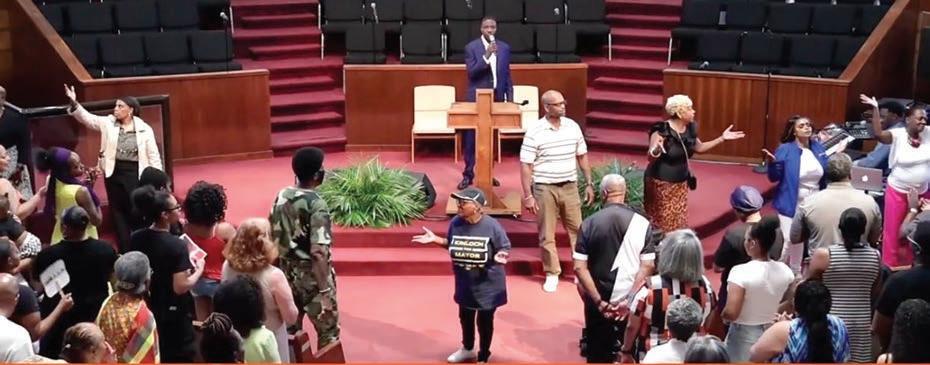
their nonprofit, tax-exempt status.
From the days of the Great Migration when thousands of Black families flocked to Detroit in search of jobs and a better life, to the pivotal role they played in the city’s cultural and musical heritage, Black Detroiters have left an indelible mark on the city. However, in recent years, Detroit has experienced significant gentrification, which has raised concerns about the displacement of long-standing Black residents. Similar to a setting sun, there’s a rising spirit, and Black Detroiters are reclaiming their place in the city, despite the challenges posed by gentrification.
According to the City of Detroit, since the start of the fiscal year 2019 to 2021, Detroit saw a 28% decrease in the
The IRS announced the change in a court document filed on Monday.
The ruling struck down the “Johnson Amendment,” which required certain organizations, including churches, to refrain from participating or intervening in campaigns for public office as a condition for
“Being able to endorse people from the pulpit, these pastors all know each other — not that they all like each other,” Lansing-based strategist Adrian Hemond told Michigan Chronicle. “But being able to endorse or get endorsements from your colleagues from their pulpits and being able to distribute literature at their churches could be pretty impactful.” Pastors have long served as polit-
ical influencers despite the 1954 tax code provision banning churches and certain nonprofit organizations from participating in “any political campaign on behalf of (or in opposition to) any candidate for public office.”
has been a deterrent for some, and some have tested it. If you are legally carrying a weapon and carrying a CPL, have a great day. If you’re
During the Great Migration, thousands of Black families from the South came to Detroit in search of jobs in the booming automobile industry. Despite facing discrimination and segregation, they built vibrant communities on the city’s east and west sides. Over time, these neighborhoods became centers of Black culture
“With these large churches, a lot of these pastors have a great deal of political experience of a slightly different kind and can help candidates leverage their networks,” Hemond said. “There have always been ‘souls to the polls’ efforts at churches. Those haven’t necessarily been affiliated with specific candidates, it’s just encouraging your congregants to get out, this just adds a layer on top of it.” Hemond mentioned another aspect of the new guidelines is how interest groups like Right to Life. Right to Life Michigan
what the Supreme Court will rule in the upcomingsion, advocates on both sides of the argument are willing to continue their
“Overturning Roe v. Wade would be a terrible break with nearly 50 years of judicial precedent and – more importantly – a blow against individual freedom. It is my hope-
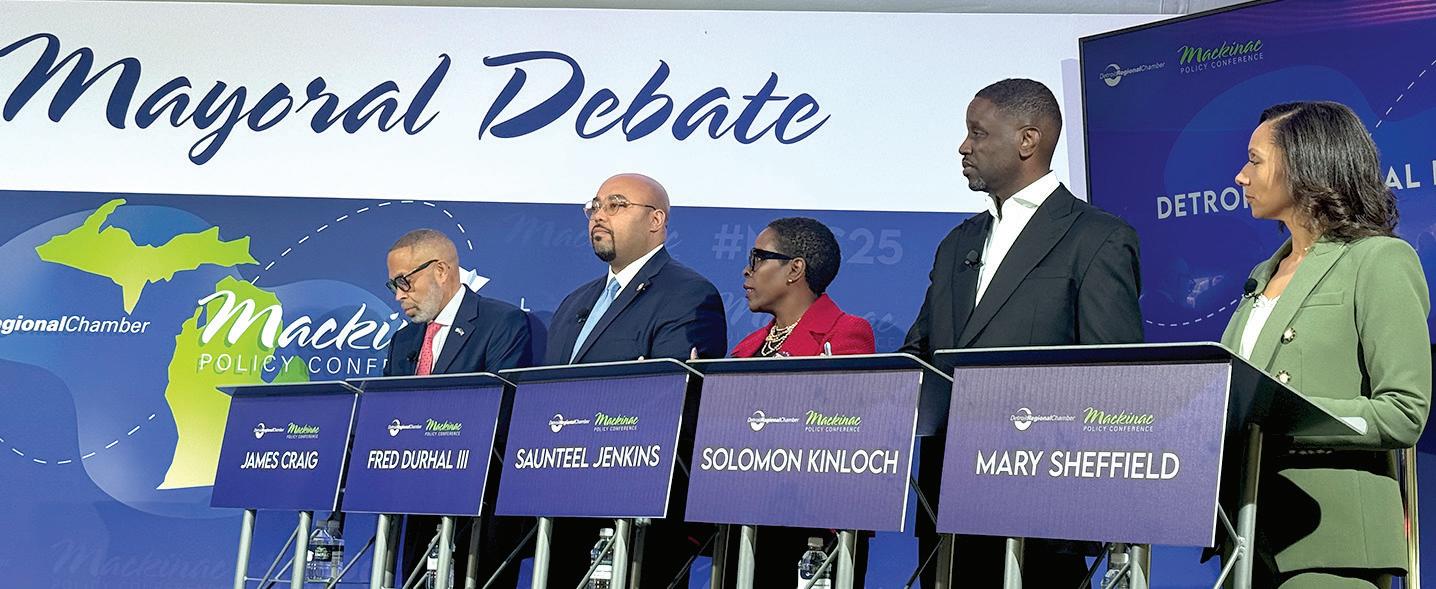
to safe, legal abortion in Michigan…”
Detroit will add another mayor to that list when they’re sworn in next year.
The African American Mayor’s Association (AAMA) wrote a letter after Trump’s State of the Union address earlier this year outlining the ways Trump’s federal government and Democratic led cities can work together.
advocacy arm, Planned Parenthood Advocates of Michigan, is a founding member of the coalition that launched Reproductive Freedom for All, a ballot initiative to affirm the right to abortion and reproductive freedom in the state constitution,” said Vasquez Giroux. “The bottom line is that we will do everything in our power to keep abortion legal in Michigan, and if SCOTUS makes that impossible, we will do everything we can to ensure our patients can access the care they need.”
corporate boards to have more diverse representation and pass the legislation.
Better collection and analysis of criminal justice data: BLAC recommends data collection and professional analysis be initiated with the assistance of our Attorney General, Michigan Commission on Law Enforcement Standards (MCOLES), Association of Michigan Prosecutors and other stakeholders to collaborate, collect and analyze data strategically.
“Our mayors need partners in Washington who understand our work and our challenges, and we look forward to working with the administration,” said AAMA president and Montgomery, AL Mayor Steven L. Reed. “There are so many vital ways we can work together: whether with federal law enforcement agencies partnering with our local law enforcement, or working with organizations like the Department of Housing and Urban Development tackling the nation’s housing crisis, or with the Department of Transportation on finalizing the implementation of the Bipartisan Infrastructure Law, and other major bipartisan measures like the Bipartisan Safer Communities Act. We want this Administration to consider the African American Mayors Association and our member mayors as partners for the Administration’s urban and rural agenda and every federal policy area afmunicipalities.”
Ban no-knock warrants: Urging the House Government Operations Committee to hold hearings on HB 5013 and other legislation that would ban or limit the use of noknock or quick knock warrants, and urging the state legislature to pass meaningful reform and advise Gov. Whitmer to sign the bill after the leg-
Reed, LaToya Cantrell of New Orleans, Andre Dickens of Atlanta spoke at a recent Michigan Chronicle Pancakes and Politics about what it means to govern while Black with limited support from a Republican-controlled state government.
the chancellor embraces.
“You can attack the governor and feel good about it,” Reed said. “But he can block 50 things that you never see.” Dickens is Atlanta’s seventh straight Black mayor.
More than legal implications, overturning Roe v. Wade would impact several systems across the spectrum. With the potential to drive both foster and adoption numbers upward, a ban on abortions could leave many women to choose a less safe route restoring ‘back alley’ and illegal abortion practices, including self-abortions. Moreover, African American women and women of color, who already have a long-storied history with access and inclusion in medi-
islature adopts it.
Justin Bibb is running for reelection in Cleveland. The primary for the office was canceled because Bibb and serial candidate LaVerne Gore were the only candidates to turn in enough signatures.
In Baltimore, Mayor Brandon Scott ran for re-election and won in the general election in November, 2024.
Increase school funding: Statutory changes to increase the School Aid Fund revenue by at least $3.6 billion and establish a permanent weighted funding formula based on student and community needs and universal preschool (0-3).
The city of Jackson, Mississippi, held a general election for mayor on June 3, 2025, which saw Mississippi state Senator John Horhn elected as the new Mayor of Jackson, Mississippi, defeating five other candidates in the general election. Horhn won with 67.2% of the vote, succeeding Chokwe Antar Lumumba, who was mayor of Jackson from 2017 to this year.
Reject censorship in history instruction: Encouraging Gov. Whitmer to ensure the goal for Michigan schools should be history instruction that is presented by professionals with the subject matter expertise, pedagogical skills, and judgment necessary to present complex information to students that are grounded in provable facts and add to the understanding of modern-day America.
In Oakland, Barbara Lee defeated Loren Taylor and seven other candidates in the April 15 special general election for mayor of Oakland. Incumbent Kevin Jenkins chose not to run for reelection after being appointed by the Oakland City Council to serve as interim mayor after voters recalled former Mayor Shen Thao last year.
Increase mental health supports for the Black community: Recommending Michigan set a goal of increasing the number of Black mental health service providers by 20% each year over five years.
Lee ran on unifying the city around public safety, housing, government accountability and economic development and highlighted her record in Congress and as a state legislator. Lee said she focused on “local issues in terms of bringing home billions of dollars to make sure that my community benefits from my work on the national and state level.”
Charlotte Mayor Vi Lyles announced this week that she will officially file for re-election on Wednesday, seeking her fifth term ahead of the election this fall. Cleveland, OH, is also likely to reelect a Black mayor later this year.
“The prime example of that is obviously the Catholic Church and Right to Life,” Hemond said. “You don’t have to endorse directly from the pulpit if you’re inviting everybody once they leave church to the nice lady from Right to Life who happens to have a scorecard of how these politicians stand on that issue.”
Members who regularly attend service tell the Michigan Chronicle that Kinloch has not been campaigning through his church. He’s been careful to keep direct mentions of his campaign out of service. However, his campaign has been felt thereby indirect references and members wearing campaign t-shirts.
“It is the thing you got to be careful with in your own church,” Hemond said. “The reason people join a church isn’t because they want to hear about politics from the pulpit. They want to hear someone preach the word. You can do a little bit of politics in your home church, but if it turns into all politics all the time, the pews are going to empty out.”
Last summer, a Northwest Detroit pastor, Lorenzo Sewell, of 180 Church,
people to become parents or expand their families against their will. Being able to decide and control if, when and how to become a parent is central to building and living a healthy, happy life,” said Vasquez Giroux.
DeWayne Davis, state Sen. Omar Fatah, Jazz Hampton and Brenda Short are challenging white Minneapolis mayor Jacob Frey. Frey, a young progressive, received criticism
Beyond the scope of pro-choice versus prolife, the fight for reproductive choice is one of freedom. As Michigan officials work to ensure each woman who finds herself in the position to choose has access to care without the threat of legal action, many wonder
Black Lives Matter protestors in 2020 after George Floyd was murdered in Minneapolis.
Sam Robinson can be reached at srobinson@ michronicle.com.
ings of this draft. If that is not the case, we need to stand with Senate Majority Leader Schumer and Gov. Whitmer in support of their efforts to preserve the right to reproductive freedom,” said Chair Alisha Bell, on behalf of the Wayne County Commission.
river was toxic, and they knew it.”
Lathan Jefferson said his call triggered a 17-minute conversation between the White House and then-Governor Rick Snyder. “He knew what that river was,” he said. But even when General Motors was allowed to switch back to Detroit’s water in October 2014—be cause the Flint River was corroding auto parts—residents were told it was too expensive to return the same privi lege to households.
The health committee recommends reviewing state licensure policies to address the barriers that Black psychologists face in obtaining licensure in Michigan.
“That’s not democracy. That’s dicta torship,” Bishop Jefferson said. “When you take control and have one say-so over everything and everybody, that’s not democracy.”
Ensure equitable distribution of state health funds: Ensure all Michigan communities with a significant Black population receive adequate funds to address mental health issues.





just have streets with one or two homes.”
Even funding meant to help the city rebuild, like American Rescue Plan dollars, hasn’t reached the people as promised. “They didn’t do with the ARPA funds what they were supposed to do,” she said. “If they would quit dumping on Flint and begin to help us, we could be made whole.”
The lingering injustice in Flint is more than a failure of infrastructure—it’s a breach of human dignity. It’s a system that treated people as disposable and continues to act like harm can be closed out with paperwork.

Neely says the fight for better still continues when it comes to the city, “I am still strongly requesting that water settlement funds be released to Flint residence, that’s totally con trolled by the US District Court, by way of special master. I’m asking our federal partners to help advocate for the release of those dollars to Flint residents,” he said. “As a lifelong resident of Flint, I will continue to encourage family friends and neighbors as we move forward.”
Protecting Black voting rights: Urge state officials to remain vigilant in the fight against schemes to disenfranchise Michiganders of color.
Michigan’s Department of Environment, Great Lakes and Energy (EGLE) says it remains committed to finishing the job. Eric Oswald, director of drinking water, said the state and city are working to leave “no stone unturned.” Contractors have been ordered to visually confirm completed work. But that doesn’t erase what’s been lost. Or the way residents were treated—by government officials, utility companies, and even public health departments that failed to fully educate people about secondary exposure risks. Lathan Jefferson summed it up clearly when recounting a conversation with a local worker. “I asked, do you still drink Flint water? He said no, he has bottled water. I said, what about brushing your teeth? He said, ‘I don’t swallow it.’ I told him, ‘But you scrub it into your gums.’”
“BLAC members have worked hard to identify the needs of the Black community and we feel these recommendations will provide a solid first step towards breaking down barriers in education, community safety, health and business,” said BLAC Co-Chair Dr. Donna L. Bell.
The trauma isn’t limited to lead. Legionnaires’ disease outbreaks, at least a dozen deaths, and increased cancer rates have also been linked to the crisis. Bishop Jefferson lost family members. Others in her community were diagnosed with cancer after years of exposure. “We used to be a thriving, vibrant community,” she said. “That’s not here anymore.”
The economic toll has been just as cruel. Whole neighborhoods were gutted—first by water, then by abandonment. Bishop Jefferson pointed to vacant homes on the city’s north and east sides. “They stopped fixing houses. They stopped the money. What does that do? Deteriorate the neighborhood. We used to have communities. Now we
BLAC will hold a virtual town hall meeting
That lack of understanding—of the body, of the system, of the pain—is exactly what continues to push families like the Jeffersons to speak out.
This is year eleven. The headlines may have moved on. But Flint hasn’t. And it won’t. Not until every pipe is replaced. Not until every child harmed is accounted for. Not until communities are rebuilt—not patched over. Not until truth is met with justice.
Because in Flint, the lead never left. But neither did the people. Ebony JJ Curry can be reached at ecurry@michronicle. com.
JANICE M. WINFREY, City Clerk Chairperson, Election Commission
“Chancellor Ivery is a true transformational leader and an outstand ing CEO, who is more than worthy of the CEO of the Year Award he just re ceived, “ said Prof. James C. Mays, who teaches entrepreneurship and supply chain manage ment at WCCCD’s Corpo rate College. “In his 27 years at WCCCD, Dr. Ivery has elevated WCCCD to become nationally recog nized for excellence and innovation and preparing our students profession ally and personally to do great things in the world.”
Other cities like Minneapolis, with white mayoral incumbents, are facing challenges from Black candidates. Rev. Chaplain of the Minnesota Senate,
“I think of transformational leadership as a thoughtful approach that causes people to change but also causes the systems and circumstances they are operating in to change too,” Ivory said. “Transformational change doesn’t just ask people to do certain things; it asks them to change their view of what’s possible and excites them to drive that change together because they believe that what they’re doing will create positive change for everyone. That’s how entire systems change because people believe that they need to for themselves and others to live better lives.”
told reporters he wasn’t supporting the former president in the days leading up to hosting a July campaign event at the church. Months later, he gave the invocation at Trump’s inauguration in January.
He helped President Donald Trump win 19,667 votes in Detroit thanks to his Souls to the Polls events held on Fridays at his church in the weeks before the election. During the Trump event at the church, it was unclear whether any members of the actual congregation not connected to Sewell’s political organizing were present.
Democrats — and Independents — have long championed endorsements from faith leaders.
Detroit Mayor Mike Duggan turned heads after more than 150 Black pastors from across the state endorsed his gubernatorial bid. The endorsements were noteworthy because it marks the first time pastors like Bishop Charles H. Ellis of Greater Grace Temple and Rev. Dr. Wendell Anthony of Fellowship Chapel aren’t organizing for a Democratic candidate. Sam Robinson can be reached at srobinson@ michronicle.com.

GINA C. AVERY-WALKER Director
2978 W. Grand Blvd. Detroit, Michigan 48202-3069 PH: (313) 876-0190 F: (313) 876-0053
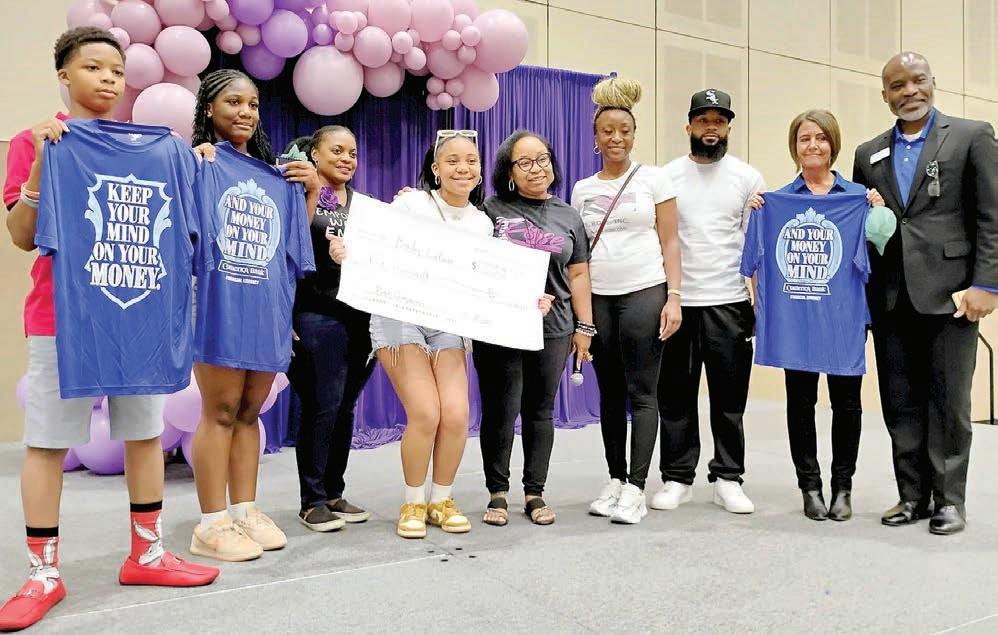

Harriet Tubman, American abolitionist and political activist, once said that “Every great dream begins with a dreamer.”
Theresa Randleman, Founder of the T-Rose Foundation, would agree with that statement. She has founded and has been hosting the Girlpreneur Expo Youth Summit for eight years. The event allows teenage girls to showcase their entrepreneurial products and projects.
“The purpose of the expo in the summit is to introduce young entrepreneurs to the world of business, providing them with a platform that they can sell their products, meet their peers, and receive workshops. They also participate in workshops that help them build their business, their confidence, self-esteem, and so forth,” said Randleman.
Initially, the program served young people who were 18 and under, and now participants can be up to 24 years old.
The Youth Summit brought together rising young professionals, budding entrepreneurs, educators, business leaders, and industry professionals for a one-of-a-kind youth business expo and summit.
“We have participants as young as six years old, all the way up to 24, who are young entrepreneurs, inspiring entrepreneurs, and some are seasoned entrepreneurs,” said Randleman.
The youth and young adults engaged in business competitions, leadership sessions and professional networking. It provided platform to enhance and exercise their professional skills.
The goal of the summit was to help transform young minds into tomorrow’s business leaders by fostering their entrepreneurial spirit, leadership and communication skills and unlocking their full potential.
There was a bevy of products on display at this year’s summit as well. “We have young ladies that do nails, we have soaps, we have cupcakes, cookies, we have bracelets, lots of jewelry that we have. We have paintings. We have young people who are drawing art-which is important because it improves their mental health.”
Randleman added, “We have a young lady who started out sell-
See T-ROSE FOUNDATION page A-8
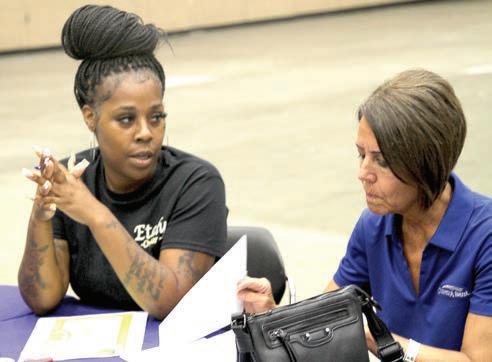
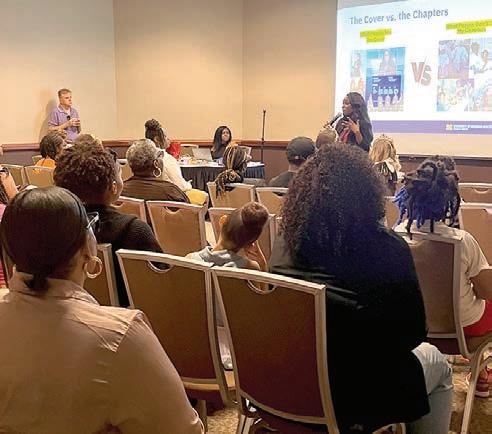
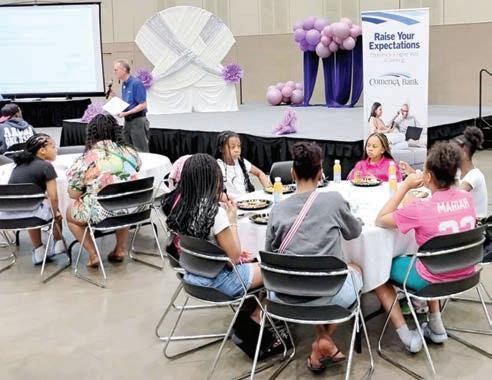


of the smaller banks, in a pool of national and global organizations, I think it really speaks volumes to what we do to support the community.”
For these companies, they believe that success is defined by thriving communities. Comerica operates with the belief that they can create shared value by supporting the viability and well-being of the businesses and people that make up the communities which they operate.
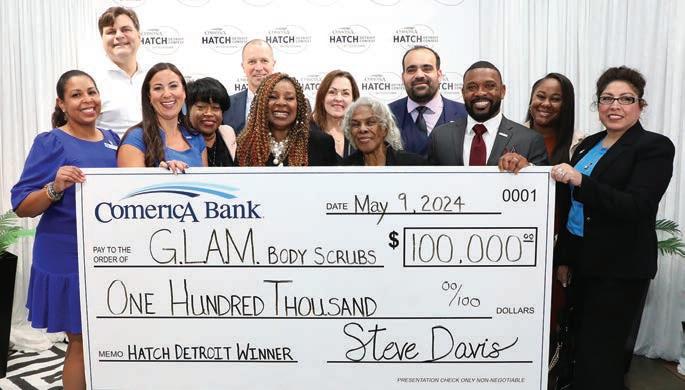
tutionalization through policies and systems, and impact measurement.
Comerica Bank once again was named among honorees for 2025.

This marks the 10th consecutive year and 11th time overall that Comerica has received the national recognition in the program’s 13-year history.
“This makes us one of a handful of companies that have been recognized consistently in the 13 years of the program,” said La Toya Rowell, Vice President and National Community Affairs Manager.
“I think that really speaks to our commitment to supporting our communities, whether that’s through philanthropic giving or volunteerism. For us to be one
“In an ever-evolving landscape, companies are looking to ensure that they can meet the needs of their communities, customers, and stakeholders,” said Jennifer Sirangelo, president and CEO, Points of Light.
“Companies like Comerica are leading the way in showing how social impact benefits their employee’s well-being, strengthens the communities where they do business, and brings value and meaning to their work. Their efforts provide a model for others looking to bring the benefits of volunteering and social impact to their workforce and they’re extremely deserving of this recognition.”
Comerica’s 2024 efforts to empower local communities included: • More than 84,000 hours of volunteer time equating
Comerica Bank donated more than $9 million in financial contributions and grants from Comerica Bank and the Comerica Charitable Foundation to empower nonprofits and other organizations serving our communities across the country.
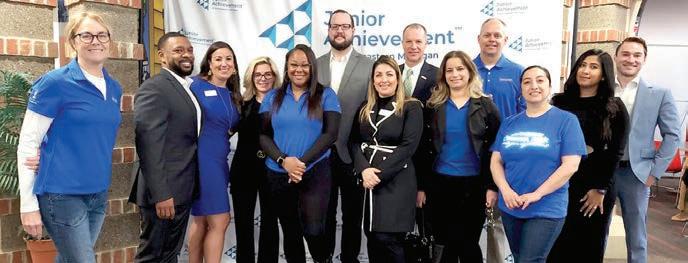

wenty-Five Years and a quarter century forever changing downtown Detroit, its image, and its potential.
A professional sports and entertainment venue that not only opens its outfield to the city’s picturesque skyline but has opened its doors to fans, guests and families for some of Detroit’s most iconic and memorable moments.
That just briefly describes Comerica Park and what it has meant to the city of Detroit, the state of Michigan, the Detroit Tigers, and Tigers fans.
Begun with an idea in the mid-1990s to become a cornerstone to Detroit’s revitalization, Comerica Park was the first piece to the two-stadium proposal solidified in 1996 that began reshaping Detroit into an international destination of events and activities.
Led by late-owner Mike Ilitch, who purchased the team in 1992, along with the Ilitch family, team officials and dignitaries, the Tigers broke ground for Comerica Park on October 29, 1997. By the end of 1998, the Tigers would settle on a naming-rights partner, Comerica Bank and a historic institution dating back to its Detroit founding in 1849.
What would follow would be millions of fans and families experiencing Comerica Park with some of their most enduring and unforgettable memories.
Like the dad who told his son, “Let’s go catch a game today,” and they would end up watching history when Justin Verlander threw his first career no hitter.
Or when friends and families displayed tears of immense joy, hugs and exuberance when Magglio Ordonez launched his walkoff home run into the night and sent the Tigers into the 2006 World Series.
There were even moments of historic disbelief that will forever be connected to Comerica Park, including Armando Galarraga’s imperfect game or also known as the 28-out perfect game. Though robbed of watching history, fans will never forget being in that stadium that very day.
And since last August, the Tigers have showed a resurgence with one of the League’s most remarkable final two months of the 2024 season. This year they have won 59 games before this week’s All-Star Break, which are the most wins in both the America and National Leagues.
Great moments, unbelievable performances and memories etched in time have been the calling card for Comerica Park since 2000.
A 25-Year Partnership and Legacy
Throughout the past 25 years, one partner has been alongside the Detroit Tigers and Ilitch Sports + Entertainment for the entire ride. Comerica Bank would become the official naming rights partner for the new Detroit stadium that would be ready for play at the beginning of the 2000 baseball season.
That relationship was further cemented in January 2018 when Comerica announced it had extended its naming rights agreement through 2034.
“Over the past 25 years, many stadiums and corporate partnerships in professional sports have come and gone,” said Steve Davis, Comerica Bank Michigan Market President. “However, in that time, Comerica Park has reshaped the landscape of downtown Detroit, and our relationship with the Detroit Tigers has continued to grow each year since its inaugural season.”
In fact, the partnership between the Tigers and Comerica is rather unique. Only two existing MLB stadiums have featured the same corporate partners longer that Comerica Park and those include Coors Field in Denver, Colo. and Tropicana Field in St. Petersburg, Fla.
That partnership features a long-lasting relationship between two historical organizations who date back over 100 years. Even at 25 years, both continue to seek ways to impact both the fan experience and the community.
“As a bank built on establishing long-lasting relationships, we understand the importance of teamwork,” said Davis. “We value our partnership with the Tigers and look forward to continuing our collaborative investment in bringing our city together, celebrating Detroit’s revitalization, providing the best fan experience and creating meaningful change to the communities we call home.”
Recently, the Tigers and Comerica have launched community-minded programs such as the Small Business of the Month.





They have recognized outstanding philanthropic leaders in the community, and over nearly the same span of time as Comerica Park they have held a weekend of festivities preserving and honoring the impact and legacy of African Americans on the game dating back to the Negro Leagues.
25th Anniversary Celebration and Festivities
While Comerica Bank is home to some of the finest baseball played today in Major League Baseball, it is also a venue that has witnessed some of entertainments greatest and historic artists. Music and concerts always have and been and will continue to be in future as a special part of Comerica Park’s great history.
This past weekend was one of the Tigers’ marquee weekends, the 25th Anniversary Celebration, presented by Comerica Bank, which provided fans with nostalgia, historic throwbacks and reliving some lifetime memories.
On Friday, the Tigers led off the weekend with a nostalgic Friday Night Party in the Park, including DJ performances with songs from the 2000s, a specialty cocktail on the Comerica Landing, a mini museum on the concourse and a “25 Facts About Comerica Park” scavenger hunt in the MLB Ballpark app.



As part of the weekend celebration of Comerica Park’s anniversary, country-music star Jordan Davis entertained the fans post-game. Concerts have been a stable of events offered at Comerica beyond Tigers games.

No matter the weather, Detroit fans support the Tigers as they cheered on some of the game’s greatest players over the last 25 years, including future Hall of Famer Miguel Cabrera. Photo Credit: Detroit Tigers. Photo Credit: Detroit Tigers.

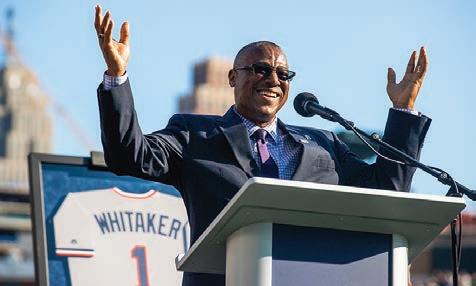
Following the game, fans stuck around for the Tigers’ second postgame concert this summer, featuring country music star Jordan Davis. Every fan with a game ticket was invited to view the show, and fans who purchased the VIP ticket package were able to watch the concert from the field.
During Saturday’s festivities, fans relived some of the most iconic moments from the past 25 years of Tigers baseball in downtown Detroit. The first 15,000 fans entering Comerica Park’s gates received a Comerica Park replica giveaway. Twenty-five special silver additions were given away and some lucky fans received a surprise replica autographed by a Tigers player or alumni, or a Detroit namesake like Eminem, Devin Booker, J.K. Simmons, Calvin Johnson, Jack White, GMac Cash, among others. Sunday closed out with a focus on Comerica Park as a community gathering space and reminiscing on the memories countless people have made there in the past 25 years. Comerica Park is not just home to the Tigers, as the historic stadium has housed more than just regular-season and playoff baseball games throughout its first 25 years.
The ballpark has hosted concerts, soccer games, the NHL’s 2013 Winter Festival, the 2005 MLB All-Star Game, World Series games, upper deck golf, citizenship ceremonies and more. Proposals, birthdays, military homecomings, gender reveals, weddings and events from all walks of life have been celebrated at Comerica Park.
Tigers Impact on the Community
Since 2000, the Tigers and the Detroit Tigers Foundation have donated more than four million tickets, sports equipment, experiences, programs, events and funds to local community organizations, nonprofits, children’s programs and more.

Different groups, teams and schools have made more than 10,000 community outings to the ballpark since its inception.
In 2005, the Detroit Tigers Foundation, the official charity of the Detroit Tigers and an affiliate of Ilitch Charities, was founded. Its mission is to enhance lives through the games of baseball and softball, with a focus on youth education, youth wellness and growing the game.
As part of the 25th anniversary of Comerica Park, the Detroit Tigers Foundation surprised five local nonprofits that have made an impact in Detroit over the last 25 years each with a $5,000 grant.
For each marquee weekend throughout the season, the Detroit Tigers are collaborating with local artists to create art pieces that represent the marquee weekend’s theme. 20-year Comerica Park employee, Stephen Burkett, has been commissioned to create an art piece reflecting upon the last 20 years he has spent working at Comerica Park.
A5 | July 16-22, 2025
By Dr. Anthony Kellum
There’s a little-known wealth-building strategy available to first-time buyers, and real estate investors one that doesn’t require deep pockets. It just takes one thing a mindset shift. If you’ve ever dreamed of owning real estate, building wealth, or securing a better future for your family, there’s a simple but powerful move you can make buy a duplex, triplex, or fourplex with an FHA loan and live in one of the units.
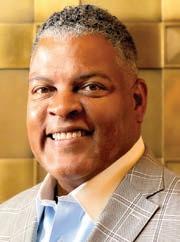
Yes, you read that right. The same loan program often used by first-time homebuyers to purchase a home can also be used to buy up to four units of income-producing property with as little as 3.5% down. This strategy isn’t just a way into homeownership. It’s a path into real estate investing without the high cost of entry. Why This Matters for Black Wealth Building
Historically, Black families have been systematically excluded from meaningful participation in the housing market. The tools of wealth accumulation through property ownership were often intentionally kept out of reach.
Today, the barriers look different but persist… rising home prices, rapidly increasing rents, tightening lending requirements, appraisal bias, and disproportionate student loan debt all continue to limit access. These modern obstacles compound the generational disadvantages already in place leaving many Black Americans without the foundation of inherited wealth or property equity that other groups are more likely to rely on. This is why the opportunity to purchase a multifamily property using an FHA loan is so significant.
It provides a rare intersection of affordability, accessibility, and wealth potential. With a low-down payment requirement and the ability to use projected rental income from the additional units to help qualify, this program offers first-time buyers the chance to enter real estate not just as homeowners, but as investors.
That distinction is critical. When a Black buyer purchases a duplex, triplex, or fourplex and lives in one of the units while renting the others, they’re not just securing housing they’re creating a financial engine that can generate income, build equity, and open the door to future investment. This model enables Black households to shift from a place of financial reaction where income goes out in the form of rent to a position of financial control, where income comes in and assets appreciate over time.
In communities where wealth gaps remain wide, and where ownership continues to be a determining factor in long-term stability and opportunity, this kind of access is transformative. It doesn’t just change one household it has the potential to change what’s possible for future generations. This is not simply about acquiring property. It’s about leveraging property to gain economic control, expand influence, and participate more fully in the systems that shape our communities and futures.
How It Works
The Federal Housing Administration (FHA) allows buyers to use its low-down payment program for properties with up to four units as long as the buyer occupies one of the units as their primary residence.
That means you could:
• Buy a duplex: live in one unit, rent the other.
• Buy a triplex or fourplex: live in one, rent the rest.
See BUILD BLACK WEALTH Page A-6
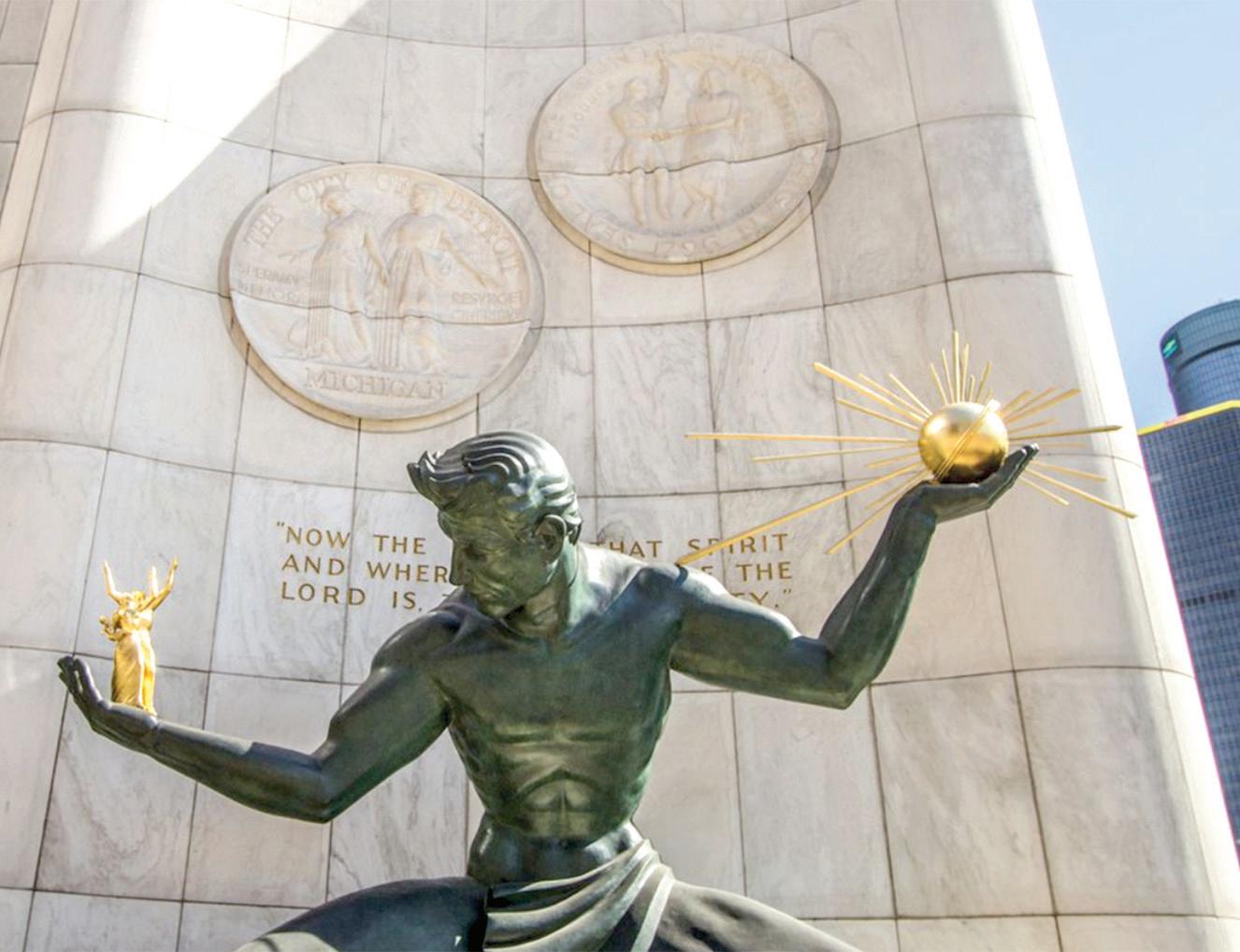
By Ebony JJ Curry SENIOR REPORTER
The weight of bureaucracy has held Detroit’s entrepreneurs in a chokehold for years. Opening a business has too often meant wading through overlapping permits, contradictory deadlines, and unclear city processes. But that tide may be turning. On Tuesday, Detroit City Council voted unanimously to approve new licensing ordinances designed to cut the red tape and open more doors for small businesses, particularly those struggling to get started or stay compliant.
The reforms come after a year-long review of the city’s licensing practices and community conversations with business owners. Some have long operated without proper licenses, not from a lack of effort or integrity but because the process was too costly, too time-consuming, and too confusing. Detroit’s leadership now says it’s time to ease that burden.
The biggest shift is the extension of the business license renewal period from one year to two. For small business owners, many of whom are running solo or with minimal staff, the annual deadline was another item on a never-ending to-do list. Missing that date could mean fines, delays, or even closure. Doubling that window is expected to reduce stress and free up time and energy for what really matters—growing the business.
Charity Dean, president and CEO of the Michigan Black Business Alliance (MBBA), has consistently pushed for a more equitable landscape for entrepreneurs in Detroit. Responding to the council’s move, she said, “You cannot grow a city without small businesses. MBBA has been working hard with the Mayor’s office to make it easier to do business in Detroit. We got a win today! Next up is decriminalizing cashless businesses and helping to solve capital issues for Detroit businesses.”
Mayor Mike Duggan’s administration backed the reforms and supported
a package that does more than stretch timelines. It introduces a new “business concierge” team—a five-member crew funded in the 2026 city budget—tasked with giving entrepreneurs hands-on, personalized help navigating the city’s permitting and licensing processes. City officials said these hires are being made now to get the initiative off the ground this year.
According to one member of the mayor’s team, who spoke ahead of the council vote, businesses have been “opening their doors in the negative.” The comment spoke to a harsh reality: too many aspiring business owners are forced to juggle city requirements alongside construction delays and permit uncertainty. Missing one item—or not knowing where to get it—can set a grand opening back by months.
Council members heard that message and responded with action. In addition to the two-year licensing cycle, they approved a provisional license option that will allow businesses to operate while they finalize documentation. They also removed a redundant health license previously required for restaurants and established a repayment program for businesses that owe under $350 in fees. Those businesses can now obtain a license while gradually paying off their fines—without interest.
For Council President Pro Tem James Tate Jr., these reforms represent the most significant change to Detroit’s business code he’s seen during his 15 years on the council. He said the changes are a move toward modernization and meaningful support, not just symbolic gestures. Council Member Fred Durhal III agreed, stating the updates are about reshaping Detroit’s business culture and signaling that the city is open for business. It’s a message many small business owners have waited years to hear.
Not all businesses will see a change.
Marijuana dispensaries, rental halls, and sexually oriented businesses are exclud-
ed from the reforms. Those industries remain governed by separate licensing requirements under state or distinct city rules.
Still, the impact is expected to be wide. By removing layers of bureaucracy, Detroit is freeing up staff at the Buildings, Safety Engineering, and Environmental Department (BSEED), which processes licenses. Instead of paper-pushing, employees can now focus on rooting out businesses that operate without any license at all. This shift, leaders say, will enhance compliance and fairness. But reform doesn’t come without a cost. The Office of Budget projected a revenue drop of $530,000 annually from the two-year licensing model—a loss that represents nearly a quarter of BSEED’s General Fund budget. Yet city officials are betting the move will spark a boom in business formation, offsetting the shortfall through increased tax revenue and economic activity.
Council Member Scott Benson pushed back on the projected losses, arguing the reforms will bring more entrepreneurs into the fold. As more businesses open and grow, he said, the city’s revenue base will expand. While the budget office acknowledged a potential rebound through increased license activity, they were unable to predict how many new businesses would emerge as a direct result of the ordinance changes.
From a broader perspective, these reforms mark a departure from the gatekeeping of the past. They are a pivot toward building an environment where Detroit’s creative thinkers, service providers, and brick-and-mortar dreamers are supported instead of stifled.
Detroit’s Black business community, in particular, stands to benefit. Many of the city’s Black-owned businesses operate with limited resources, often without the benefit of inherited wealth, large-scale
By Sam Robinson SENIOR REPORTER
Lt. Gov. Garlin Gilchrist announced Tuesday that his campaign for governor is being endorsed by 11 state lawmakers, most coming from the Michigan House of Representatives.
Michigan gubernatorial candidates are actively battling for endorsements from state lawmakers. Secretary of State Jocelyn Benson, who is also running for governor as a Democrat, already has 17 endorsements from legislators from across the state.
Lawmakers endorsing Gilchrist include Reps. Brenda Carter, D-Pontiac, Kimberly Edwards, D-Eastpointe, Morgan Foreman, D-Pittsfield Township, Peter Herzberg, D-Westland, Donavan McKinney, D-Detroit, Cynthia Neeley, D-Flint, Amos O’Neal, D-Saginaw, Laurie Pohutsky, D-Livonia and Mai Xiong, D-Warren.
State Sen. Veronica Klinefelt, D-Eastpointe, and Sen. Paul Wojno, D-Warren, were also among the names included in the endorsement announcement.
“These legislators have spent their careers fighting for their communities, and I’m honored to have their support. I’ve worked alongside many of them to deliver for work-
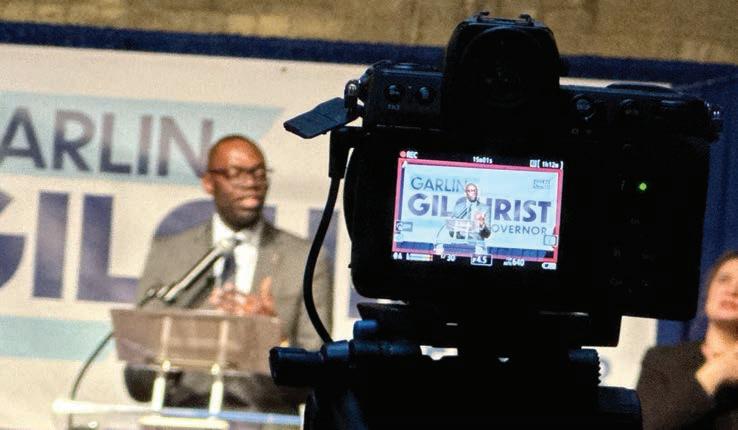
ing families, and I’m running for Governor to keep building on that progress,” Gilchrist said in a statement. “Together, we’re going to make sure that everyone in Michigan, no matter their zip code, can get ahead and find opportunity here at home.”
Gilchrist would be the first Black person ever nominated by statewide voters as the Democratic nominee for governor. He
would become the first Black governor in Michigan’s history if elected.
Xiong told the Michigan Chronicle Tuesday that she’s had the opportunity to work with Gilchrist and is proud to endorse him for governor.
“This wasn’t an easy decision — we are fortunate to have strong Democratic leaders in our state, including Secretary Benson,
who has been a national voice for protecting democracy,” Xiong said. “At the end of the day, I believe Garlin is the right person to move Michigan forward.”
Xiong added that her hope is for Democrats to unite behind their nominee after the primary.
Keith Williams, chair of the Michigan Black Democratic Party Black Caucus, announced Wednesday the group is endorsing Gilchrist.
“Lieutenant Governor Garlin Gilchrist is the clear choice for Black Michiganders — there is no other candidates who has served Michigan with the same honor, vision and dignity as Gilchrist,” Williams said. All of the lawmakers endorsing Gilchrist thus far are from Metro Detroit or Flint. Benson has support from lawmakers in Metro Detroit, West Michigan, and Traverse City.
Benson announced in January her campaign is endorsed by a number of lawmakers, including Reps Phil Skaggs, D-Grand Rapids, Joey Andrews, D-Saint Joseph, Jimmie Wilson, D-Ypsilanti, Carrie

is often called “house hacking.” But for our community, it’s more than a hack it’s a launchpad.
Imagine this: A young professional in Atlanta, Chicago, Cincinnati, Detroit, Houston, Pittsburgh, and Philadelphia buys a four-unit property for $500,000. She puts down $17,500 (3.5%), lives in one unit, and rents out the other three. With rents averaging $1,200 per unit, her total rental income is $3,600/month more than enough to cover her mortgage, taxes, and insurance. She lives rent-free, builds equity, and positions herself to buy another property in a few years.
What You Need to Prepare
To make this move, preparation is key:
Credit Score: FHA generally requires a minimum score of 580 for 3.5% down. Down Payment: Save at least 3.5% of the purchase price, plus closing costs. (Gift funds are allowed!)
Income: You’ll need stable income, but
investors, or corporate backstops. When systems are complex and unforgiving, these businesses pay the price first—and hardest. Simplifying the process of starting and sustaining a business in Detroit is a step toward leveling the playing field, especially for those who’ve long navigated the city’s corridors without a guide.
The “white glove service” promised by the business concierge team could become a critical bridge for mom-and-pop shops unsure of their next steps. By offering targeted assistance, the team has the potential to eliminate avoidable delays and support better outcomes, particularly for businesses in historically under-resourced neighborhoods.
Angela Whitfield-Calloway was absent during the official vote but voiced her support for the ordinance changes upon her return. Her statement underscored a broader sense of unity among council members—a rare but welcome occurrence for legislation with such tangible consequences for everyday Detroiters.
The technology updates embedded in the licensing process are another tool in the reform package. Streamlining digital applications will help business owners move more quickly and with more transparency. That matters in a city where digital access can be uneven and administrative fatigue is real.
For years, Detroiters have watched others cash in on their city while local entrepreneurs waited for permission to participate. This vote aims to break that pattern. It lays the groundwork for a Detroit that is easier to do business in—not just for corporate developers but for the food truck operator, the beauty salon owner, the neighborhood hardware store, and the after-school art space.
What happens next depends on how the city implements these changes. If the new
future rental income from the other units may count toward your qualifying amount.
Lender: Not all lenders specialize in multifamily FHA loans work with someone experienced and willing to guide you.
Team: You’ll want a solid real estate agent, inspector, and mentor if possible. Don’t do this alone.
The Long-Term Play
The beauty of starting with a duplex or fourplex is that it opens multiple doors literally and figuratively. You can:
• Refinance later into a conventional loan and use FHA again on another property.
• Use rental income to pay off debt or save for the next investment.
• Leave a legacy property for your children or family trust.
So, if you’ve been waiting for the right time to invest, this is it. If you’ve been wondering how to start building generational wealth, this is how.
Property is Power! One property. Multiple streams. A lasting impact.
Property is Power! is a movement to promote home and community ownership. Studies indicate homeownership leads to higher graduation rates, family wealth, and community involvement.
concierge team is empowered, if tech upgrades are rolled out equitably, and if the licensing reforms are consistently enforced, this could be a turning point. But if implementation stalls or oversight is lax, the gap between policy and progress could widen.
For now, the city is saying loud and clear: Detroit’s small businesses matter. And finally, the systems they operate under are beginning to reflect that truth.
Ebony JJ Curry can be reached at ecurry@ michronicle.com.
Rhenigans, D-Ann Arbor, Julie Brixie, D-Lansing, Betsey Coffia, D-Traverse City, Dylan Wegela, D-Garden City, Jennifer Conlin, D-Ann Arbor, Jason Morgan, D-Ann Arbor, Kelly Breen, D-Novi, Penelope Tsernoglou, D-Lansing, Natalie Price, D-Berkley, Denise Mentzer, D-Mt. Clemens and Tonya Meyers, D-Detroit. Sen. Sean McCann, D-Kalamazoo, is also endorsing Benson.
The other Democrat running to earn the party’s nomination next August is Genesee County Sheriff Chris Swanson.
Republicans who have entered the race include Senate Minority Leader Aric Nesbitt, R-Porter Township, former Attorney General Mike Cox of Livonia, U.S. Rep. John James, R-Shelby Township, former House Speaker Tom Leonard of DeWitt Township and former congressional candidate Anthony Hudson of Grand Blanc Township.
Detroit Mayor Mike Duggan is running as an independent.
James would become the second Black man to win the nomination for governor as a Republican. Former Wayne County Executive Bill Lucas changed parties and earned the Republican Party’s support in 1986. His challenge of Gov. Jim Blanchard, a Democrat, was unsuccessful.
Sam Robinson can be reached at srobinson@michronicle.com.




ATTENTION: WAYNE COUNTY RESIDENTS
Would you benefit from affordable, high quality rental housing?
MSHDA’s Project-Based Voucher (PBV) may be able to help. The PBV program is a federally funded rental subsidy program that may assist people living at Martin Gardens of Detroit with paying their rent.
MSHDA is partnering with Martin Garden of Detroit LDHA LP, KMG Prestige, Inc and Community Management Associates, Inc to make rental assistance available for Martin Gardens of Detroit. This project has three historic apartment buildings: Clark Apartments, Martin Gardens Apartments and Vernor Townhomes located in the Hubbard Farms Historic District. A total of 12 units will be available: 7/2BR, 4/3BR and 1/4BR.
The PBV waiting list will be established by MSHDA beginning Wednesday, July 16, 2025, and will remain open indefinitely. You may qualify for assistance if your family income falls within the allowable limits 30% percent of area median income for Wayne County; and the following PSH target populations:
Category I Staff at MiSide Health’s Housing Resource Center will be accepting inquires beginning Wednesday July 16, 2025. Please call: 313-481-7943 Monday –Friday between the hours of 9 am and 4:30 pm to receive further information about Martin Garden’s Affordable Housing Development.
NOTE: Proof of legal identity (birth) and proof of a valid Social Security number will be required for all members of the household.






By Sam Robinson SENIOR REPORTER
Triumph Church pastor Rev. Solo-
mon Kinloch Jr. has been endorsed by The Black Slate Inc., a group that has been endorsing candidates it believes will best represent the interests of the city’s Black residents for fifty years.
Kandia Milton is an associate pastor at the Shrine of the Black Modanna and chair of The Black Slate. Milton said in an interview with Michigan Chronicle that it was a tough decision, with spirited conversation between members before ultimately deciding to endorse Kinloch. It wasn’t just his policy positions, but the depth of Kinloch’s answers on how to get there, Milton said.
“We interviewed all the candidates who requested support from the Black Slate and of the five mayoral candidates who made the request on time, we simply thought Kinloch was the right candidate in this time,” Milton said. “Everything from his policy position on affordable housing and training, education, public safety and transportation.”
Milton also pointed to Kinloch’s attitude toward public safety as another major factor that set him apart from other candidates.
“That was another issue that was important to us,” Mitlon said. “Not so much teh militarization of the police department, throwing more police on the street. But rather, some programmatic things we can do to address the underlying issues that lead people to crime as a way of solving our crime problem. Community violence intervention, job access and training and counseling with families.”
Milton said they asked Kinloch about how he would split his responsibilities with Triumph Church and the city if elected as mayor.
“He has a substaintial congregation


but one of the things that gave us comfort was the fact he has a team in place currently and operational practices in place that keeps his church running — we think he has the infrastructure.”
Milton also pointed to U.S. Sen. Raphael Warnock, who he described as one of the most respected members of Congress.
“Raphael Warnock is pastoring a historic church with great implications and responsibility that come with that ministry,” Milton said. “He’s done an effective job of being both the pastor of the church and spending all week in Washington DC. I see the same characteristics in pastor Kinloch.”
As for city council, The Black Slate endorsed the incumbents for the two at-large seats, Mary Waters and Coleman Young II. The group also endorsed the incumbent in District 2, Angela Whitfield Calloway. In District 5, UAW retiree Renata Miller earned the endorsement, and Denzel McCampbell, a Democratic Socialist, got the nod in District 7.
“Many of our members have had the benefit of seeing Denzel McCampbell over the years really be deeply
STATE OF MICHIGAN BEFORE THE MICHIGAN PUBLIC SERVICE COMMISSION **** NOTICE OF HEARING FOR THE ELECTRIC AND GAS CUSTOMERS OF DTE ENERGY COMPANY CASE NO. U-21672
• DTE Electric Company and DTE Gas Company requests Michigan Public Service Commission’s approval of the reconciliation of DTE’s Energy Waste Reduction (EWR) plan, for the plan year 2024, and authority to implement EWR surcharges, and other related relief.
• The information below describes how a person may participate in this case.
• You may call or write DTE Energy Company One Energy Plaza, Detroit, MI 48226, 800-477-4747, for a free copy of its application. Any person may review the documents at the offices of DTE Energy Company or on the Commission’s website at: https://mi-psc.my.site.com/s/
• A pre-hearing will be held:
DATE/TIME: Tuesday, August 5, 2025 at 10:00 AM BEFORE: Administrative Law Judge Katherine E. Talbot
LOCATION: Video/Teleconferencing
PARTICIPATION: Any interested person may participate. Persons needing any assistance to participate or who are seeking access to the video/teleconference should contact the Administrative Law Judge’s secretary at (517) 284-8130 or by email at LARA-MOAHR-PSC@ michigan.gov in advance of the hearing. The Michigan Public Service Commission (Commission) will hold a pre-hearing to consider DTE Electric Company & DTE Gas Company’s (DTE Electric & DTE Gas) June 27, 2025 application requesting the Commission to: 1) determine that DTE Electric & DTE Gas’s reconciliations for its 2024 Energy Waste Reduction (EWR) plan year is just and reasonable, and that they meet all relevant requirements of Act 295 as amended; 2) approve DTE Electric & DTE Gas’s reconciliations for the 2024 EWR plan year, the performance incentives, and the associated proposed tariffs; 3) approve the necessary accounting authority as proposed by DTE Electric & DTE Gas; and 4) grant DTE Electric & DTE Gas other and further relief as is just and reasonable. All documents filed in this case shall be submitted electronically through the Commission’s E-Dockets website at: https://mi-psc. my.site.com/s/. Requirements and instructions for filing can be found in the User Manual on the E-Dockets help page. Documents may also be submitted, in PDF format, as an attachment to an email sent to: mpscedockets@michigan.gov. If you require assistance prior to e-filing, contact Commission staff at (517) 284-8090 or by email at: mpscedockets@michigan.gov
Any person wishing to intervene and become a party to the case shall electronically file a petition to intervene with this Commission by July 29, 2025. (Interested persons may elect to file using the traditional paper format.) The proof of service shall indicate service upon DTE Energy Company’s attorney, Breanne K. Reitzel, One Energy Plaza., 1650 WCB, Detroit, MI 48226. The prehearing is scheduled to be held remotely by video conference or teleconference. Persons filing a petition to intervene will be advised of the process for participating in the hearing.
Any person wishing to appear at the hearing to make a statement of position without becoming a party to the case may participate by filing an appearance. To file an appearance, the individual must attend the hearing and advise the presiding administrative law judge of their wish to make a statement of position. Mich Admin Code, R 792.10413 (Rule 413). Any person wishing to file a public comment may do so by filing a written statement in this docket. The written statement may be mailed or emailed and should reference Case No. U-21672. Statements may be emailed to: mpscedockets@michigan.gov. Statements may be mailed to: Executive Secretary, Michigan Public Service Commission, 7109 West Saginaw Hwy., Lansing, MI 48917. All information submitted to the Commission in this matter becomes public information, thus available on the Michigan Public Service Commission’s website, and subject to disclosure. Please do not include information you wish to remain private. For more information on how to participate in a case, you may contact the Executive Secretary at the above address or by telephone at (517) 284-8090. Requests for adjournment must be made pursuant to Michigan Office of Administrative Hearings and Rules R 792.10422 and R 792.10432. Requests for further information on adjournment should be directed to (517) 284-8130. Jurisdiction is pursuant
engaged in community,” Milton said. “With The Black Slate being a grassroots born political action group that dates back to the 1950s, a person in community in the way that Mr. McCampbell has been in community is really a throwback. He’s taken the modern day practices and applied it to grassroots organizing without abandoning the traditional organizing efforts. Since the 1950s, community outreach has been central to who we are.”
Regina Ross, who was the runner up in District 7 in 2021, and State Rep. Karen Whitsett, D-Detroit are also running in District 7. Whitsett did not request an interview, Milton said.
State Rep. Helena Scott, D-Detroit, is also vying to leave the Michigan Legislature to challenge Calloway. Former District 2 councilman Roy McCallister is also running for the seat.
In District 5, Willie Burton, George Adams Jr., Michael Hartt, Esther Haugabook, Tatjana Jackson and Michael Ri’chard are also running.
Mayoral candidates include Mary Sheffield, Saunteel Jenkins, Fred Durhal III, Joel Haashiim, James Craig, John Barlow and DaNetta Simpson.
THE MICHIGAN PUBLIC SERVICE COMMISSION **** NOTICE OF HEARING FOR THE ELECTRIC AND GAS CUSTOMERS OF DTE ENERGY COMPANY CASE NO. U-21681
• DTE Electric Company and DTE Gas Company requests Michigan Public Service Commission for approval of their Energy Waste Reduction (EWR) Plans pursuant to MCL 460.1001 et seq. (2008 PA 295, the Michigan Clean, Renewable, and Efficient Energy Act as amended), and authority to implement EWR surcharges, and other related relief.
• The information below describes how a person may participate in this case.
• You may call or write DTE Energy Company One Energy Plaza, Detroit, MI 48226, 800-477-4747, for a free copy of its application. Any person may review the documents at the offices of DTE Energy Company or on the Commission’s website at: https://mi-psc.my.site.com/s/
• A pre-hearing will be held:
DATE/TIME: Thursday, August 7, 2025 at 10:00 AM
BEFORE: Administrative Law Judge Sally L. Wallace LOCATION: Video/Teleconferencing
PARTICIPATION: Any interested person may participate. Persons needing any assistance to participate or who are seeking access to the video/teleconference should contact the Administrative Law Judge’s secretary at (517) 284-8130 or by email at LARA-MOAHR-PSC@ michigan.gov in advance of the hearing.
The Michigan Public Service Commission (Commission) will hold a pre-hearing to consider DTE Electric Company and DTE Gas Company’s (DTE Electric & DTE Gas) June 27, 2025 application requesting the Commission to: 1) determine that DTE Electric & DTE Gas’s Energy Waste Reduction (EWR) Plans are reasonable and prudent, and that they meet all relevant requirements of Act 295, as amended; 2) approve the proposed 2026-2029 EWR Plan surcharges and Performance Incentive mechanisms; 3) approve the necessary accounting authority as proposed by DTE Electric & DTE Gas; and 4) grant DTE Electric & DTE Gas other and further relief as is just and reasonable.
All documents filed in this case shall be submitted electronically through the Commission’s E-Dockets website at: https://mi-psc. my.site.com/s/. Requirements and instructions for filing can be found in the User Manual on the E-Dockets help page. Documents may also be submitted, in PDF format, as an attachment to an email sent to: mpscedockets@michigan.gov. If you require assistance prior to e-filing, contact Commission staff at (517) 284-8090 or by email at: mpscedockets@michigan.gov
Any person wishing to intervene and become a party to the case shall electronically file a petition to intervene with this Commission by July 31, 2025. (Interested persons may elect to file using the traditional paper format.) The proof of service shall indicate service upon DTE Energy Company’s attorney, Breanne K. Reitzel, One Energy Plaza., 1650 WCB, Detroit, MI 48226. The prehearing is scheduled to be held remotely by video conference or teleconference. Persons filing a petition to intervene will be advised of the process for participating in the hearing.
Any person wishing to appear at the hearing to make a statement of position without becoming a party to the case may participate by filing an appearance. To file an appearance, the individual must attend the hearing and advise the presiding administrative law judge of their wish to make a statement of position. Mich Admin Code, R 792.10413 (Rule 413).
Any person wishing to file a public comment may do so by filing a written statement in this docket. The written statement may be mailed or emailed and should reference Case No. U-21681. Statements may be emailed to: mpscedockets@michigan.gov. Statements may be mailed to: Executive Secretary, Michigan Public Service Commission, 7109 West Saginaw Hwy., Lansing, MI 48917. All information submitted to the Commission in this matter becomes public information, thus available on the Michigan Public Service Commission’s website, and subject to disclosure. Please do not include information you wish to remain private. For more information on how to participate in a case, you may contact the Executive Secretary at the above address or by telephone at (517) 284-8090. Requests for adjournment must be made pursuant to Michigan Office of Administrative Hearings and Rules R
and R
Requests for further information on adjournment should be directed to (517) 284-8130. Jurisdiction

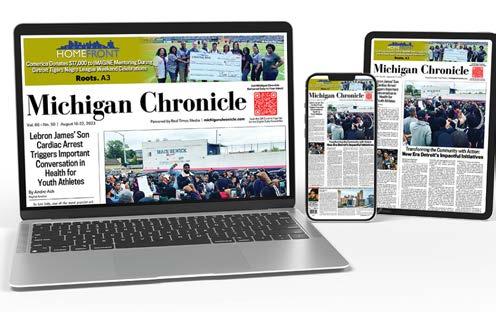

Gas’s Gas Cost Choice (GCC) customers Reservation Charge revenues of $3.74 million, GCC customers’ $3.51 million in reservation expense, the roll-in of approximately $0.05 million related to the GCC customers’ 2023-2024 reconciliation and $0.01
of interest expense owed to GCC customers to
customer over-recovery of approximately $0.27 million; 3) approve that the calculated amount of DTE Gas’s under-recoveries, together with interest, is correct, and that the disposition of that amount is consistent with the intent and in accordance with the guidelines established by the Commission in its Orders; and 4) grant DTE Gas other relief as deemed necessary. All documents filed in this case shall be submitted electronically through the Commission’s E-Dockets website at: https://mi-psc. my.site.com/s/. Requirements and instructions for filing can be found in the User Manual on the E-Dockets help page. Documents may also be submitted, in PDF format, as an attachment to an email sent to: mpscedockets@michigan.gov. If you require assistance prior to e-filing, contact Commission staff at (517) 284-8090 or by email at: mpscedockets@michigan.gov.
Any person wishing to intervene and become a party to the case shall electronically file a petition to intervene with this Commission by August 7, 2025. (Interested persons may elect to file using the traditional paper format.) The proof of service shall indicate service upon DTE Gas Company’s attorney, Carlton D. Watson, One Energy Plaza, 1650 WCB, Detroit, MI 48226.
The prehearing is scheduled to be held remotely by video conference or teleconference. Persons filing a petition to intervene will be advised of the process for participating in the hearing.
Any person wishing to appear at the hearing to make a statement of position without becoming a party to the case may participate by filing an appearance. To file an appearance, the individual must attend the hearing and advise the presiding administrative law judge of their wish to make a statement of position. Mich Admin Code, R 792.10413 (Rule 413). Any person wishing to file a public comment may do so by filing a written statement in this docket. The written statement may be mailed or emailed and should reference Case No. U-21440. Statements may be emailed to: mpscedockets@michigan.gov. Statements may be mailed to: Executive Secretary, Michigan Public Service Commission, 7109 West Saginaw Hwy., Lansing, MI 48917.
All information
The Discovery Center, located in Mount Clemens, recently held the organization’s annual Kids’ Business Fair as part of the Made in Michigan Show.
Kids’ Business Fair presents kids ages 10-17 years old with the opportunity to learn and explore the possibilities of entrepreneurship.
Comerica Bank has supported the Kids’ Business Fair in recent years providing financial education to the young entrepreneurs.
“I was so impressed with the dozen or so young entrepreneurs and their exciting businesses,” said Mike Cheatham, Comerica Bank Vice President and External Affairs Market Manager. “These ‘CEO’s’ were chosen for their outstanding displays, business models and pitches, but all of the entrepreneurs are winners in my book.”
The Discovery Center of Macomb is a family-fun science site offering youth workshops, free events, and educational
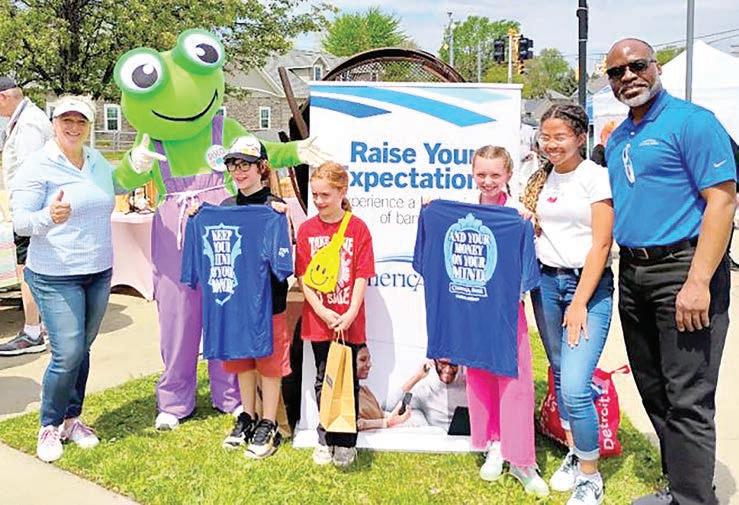
to more than $2.8 million donated to nonprofits by colleagues, according to the Internal Revenue Service.
• $1.6 billion portfolio of public welfare investments, including approximately $121 million in 2024 commitments.
From page A-3
ing fanny packs but has advanced her programming to selling journals that target mental health. She’s had difficulties in her young journey, and she started journaling; it made her feel better. And so now she wants to share that with young people and let them know that it’s okay to write down their cares and their concerns.”
In addition to the expo where the young people showcase their wares. They also attend several special events--one of which includes financial education.
“It’s very, very important for them to understand their money, how they’re receiving and how to reinvest in themselves--Those sessions were conducted by Comerica Bank, and I am very thankful for their support.”
She adds that for the young people to be able to “come in and hear from someone in the banking business is very, very important, and it is empowering for the kids.”
Other sessions included a talk by a former representative for a national accessory store. “She came and she talked about marketing and branding their product,” said Randleman. “There was also a session on impostor syndrome, which captured the attention of everyone in the room, parents and kids. And that was an important segment.”
She went on to list and expands on presentations that explain grants, how to get funding, how to look for funding, and write grants for their businesses.
The event includes a yoga session where participants learned how to relax, how to breathe when they are preparing for moments like big events and interviews.
with United Way.
• $318 million in lending and investment to support affordable housing.
• Approximately 102,000 individuals from lowto moderate-income communities reached through the Comerica $ense financial education programs with community nonprofit partners supporting adult, seniors, youth (including pre-K to 5th grade) and young adults. One of the company’s signature campaigns is
• More than $9 million in financial investments from Comerica Bank and the Comerica Charitable Foundation made to empower nonprofits and other organizations serving our communities.
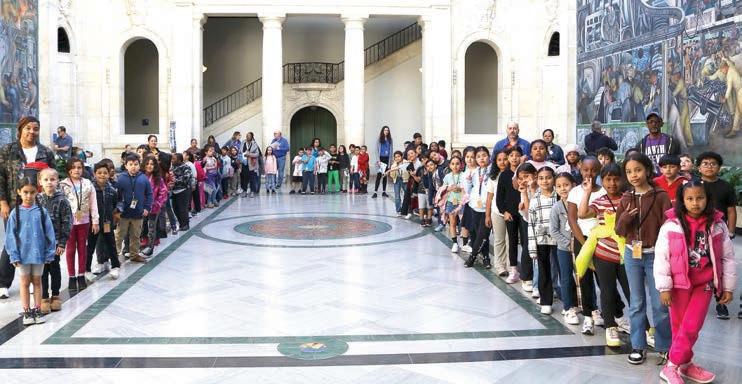
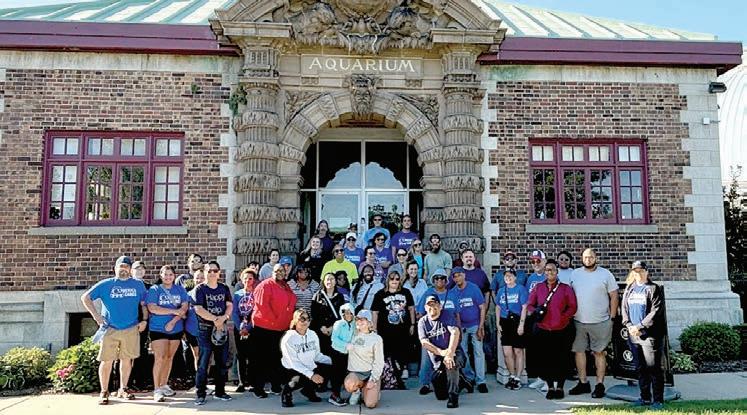
hours of volunteer time in 2024.
“Our colleagues raised money in support of United Way and expended more than 14,000 volunteer hours during that campaign time, which usually starts mid-September and ends in mid-October,” Rowell said. “During a month’s time we’re able to raise approximately $1.7 million. I believe that’s the most money we’ve ever raised for United Way.”
Another example is Comerica’s participation in Dia del Nino in multiple markets while integrating one of Comerica’s larger financial education volunteer activities. “Day of the Child” focuses on education in Hispanic communities, but it is open to all communities to be a part of it.
Comerica hosts different events and activities across markets and delivers the financial education piece in support of the community. The goal is to assist the youngest members of the community and create great starting points as they excel and grow in their life.
“Comerica remains rooted in our belief that strong communities create strong futures,” said Wendy Bridges, Comerica Bank Executive Vice President of Corporate Affairs. “Through strategic philanthropic investments, a workforce dedicated to volunteerism, and financial education programs designed to empower our communities, we are committed to being a ‘Force For Good’ across all the communities we serve.”
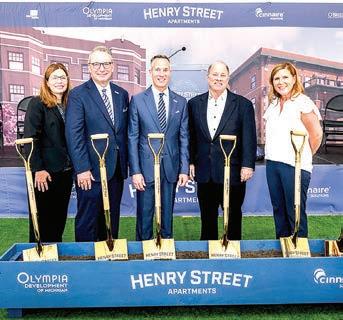
In 2024, Comerica totaled $318 million in lending and investment to support affordable housing. Credit: Ilitch Holding, Inc.
“I think it’s always important for them to be able to breathe, know how to breathe and relax, and be in, you know, situations that they can utilize those techniques right on the spot,” said Randleman.
Randleman noted that “the support from Comerica has allowed me to grow my business, much greater than I could have on my own. Their support has been tremendous, and they bring something to the table that I don’t have. So, the partnership I will say is very, very meaningful for me because it helps me to enhance my vision and to complete my vision effectively. They come in and they provide very, very valuable information.
“As an entrepreneur myself, I didn’t have that, and I want to give the kids some of the things that I did not have, and, of course, things that I have experienced. But Comerica brings so much to the table that I could not bring to the table, and it’s just helped me tremendously.”
Comerica Bank Vice President and External Affairs Market Manager Mike Cheatham helped facilitate Comerica’s partnership with the T-Rose Foundation.
“We had a great time at Girlpreneur Expo,” said Cheatham. “In collaboration with our partner the T Rose Foundation, we were able to empower the next generation of small business owners. The day offered valuable information and exciting performances. The young vendors had the opportunity to gain real world experience, while learning from seasoned entrepreneurs and experts from a wide range of industries.”
Financial education delivered by Comerica covered topics such as savings and budgeting, marketing and Entrepreneurship 101.
The Expo also featured several of the young attendees participating in a pitch competition.
The next GirlPreneur Summit will take place on October 25 in Detroit.
T-Rose Foundation is a registered 501c3 organization providing support to organizations with aspirations to build a strong, healthy, positive future for our youth. T Rose reaches youth, primarily girls, early in their social developmental years to promote positive self-esteem and self-image, by providing support in personal development through social etiquette, health and wellness, and life skills; advancing a sense of self-mastery while building a meaningful relationship with their personal and professional gifts and talents; and embracing entrepreneurship and leadership as future leaders and courageous changemakers. For more information, visit t-rosefoundation.org.
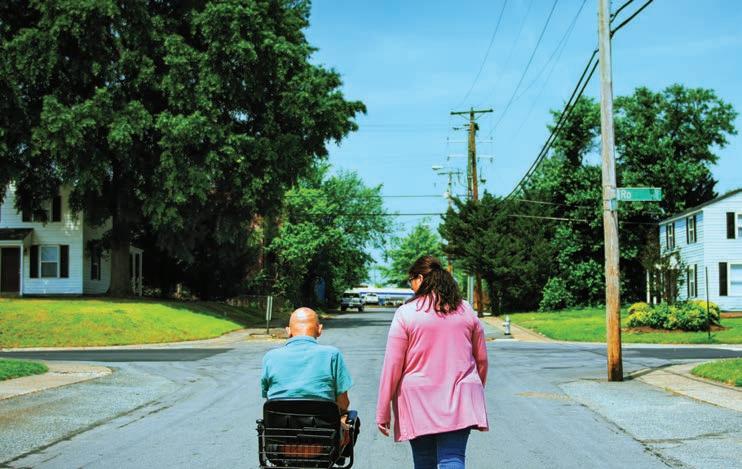







B1 | July 16-22, 2025
By Sam Robinson SENIOR REPORTER
Detroit residents filled sidewalks on Livernois Avenue Saturday for the annual Light Up Livernois on the Avenue of Fashion, which this year brought together community, business, and politics.
Simply Casual and Shoehouse Boulevard owner Rufus Bartell and multimedia artist Roscoe Davis are behind the massive effort to activate the area on the Fourth of July Weekend.
They say the idea came from wanting to create an economic impact in the historic business district.
“It’s a space to showcase our fashion roots, our musical heartbeat, and the entrepreneurs driving growth in one of Detroit’s most iconic neighborhoods,” Bartell told Michigan Chronicle.
Bartell’s brother, Algernon Bartell, owner of the Times Square Men’s Custom Clothing Store, opened the storefront in 2010. His family, which owns many businesses on the avenue, are behind an effort to bring more foot traffic to the area.
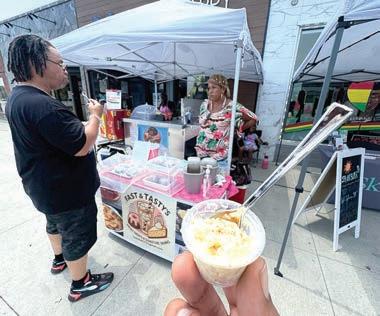
Armetris Hare told the Chronicle her business, Fast & Tasty’s, stayed busy selling seven-up pound cake, banana pudding, and gluten-free cheesecake throughout the entire event. Hare turned those who were just passing by into customers by handing out free samples of her delicious banana pudding.
Lloyd Richardson, 64, who lives on San Juan Drive, said in an interview, waiting for his order of fried fish beside the Bridge Moe’s food truck, that the event has energized the neighborhood each fourth of July weekend.
“It’s makes you feel good to see this many people walking up here and enjoying this neighborhood. It wasn’t always like that,” Richardson said. “That’s why it means so much to these folks because it’s important to take pride where you live.”
The event featured artists rapping and singing on stage, a fashion show for adults, and one “Toy Story” theatrical fashion show for kids. The Jit Masters entertained crowds with dances and beginner jit tutorials for people wanting to speed up their footwork outside of Lily’s & Elise Tea & Coffee House.
With yard signs for mayoral candidate James Craig lining the outside of Mike’s Fresh Market, it was impossible for attendees to ignore the fact that the city is in the middle of a pivotal election year.
Craig wasn’t the only candidate to make a footprint at the event.
While small businesses set up grills and food trucks, candidates for mayor and city council brought tables and campaign literature. Campaign staffers for Triumph pastor Solomon Kinloch, attorney Todd Perkins, and THAW CEO Saunteel Jenkins passed out flyers
See LIGHT UP LIVERNOIS Page B-2
Where City Meets Life and Life Meets Style
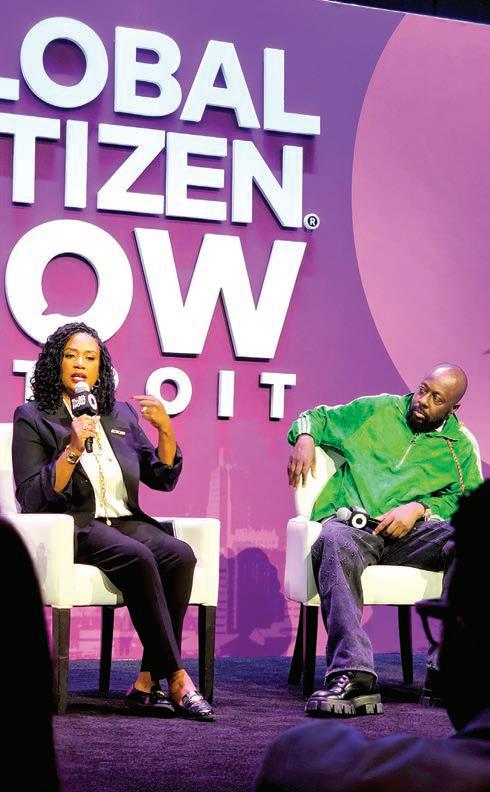
By Ebony JJ Curry SENIOR REPORTER
Global Citizen didn’t choose Detroit for optics. It chose Detroit because this city — forged in labor, culture, and refusal — reflects exactly the kind of ground-up transformation global movements now depend on. The decision to hold its first American summit outside of New York in a majority-Black city with a complicated history and a rising population wasn’t symbolic. It was strategic. Because Detroit doesn’t just talk about resilience; it lives it.
“You don’t know my Detroit,” said Jessica Moore as she opened the conference. And that wasn’t an introduction. That was a charge. Her words weren’t about branding the city for outside validation. They were about reclaiming the narrative from within. For decades, Detroit has been portrayed as either broken or “bouncing back.” But the truth lives in the middle — in communities that never left, in people who rebuilt block by block, and in new coalitions shaping the future on their own terms.
That’s why Simon Moss, co-founder of Global Citizen, made the pivot clear: “We can get beyond partisan politics a lot of the time when you’re dealing with a group of people in a city who all literally live there. That’s easier a lot of the time to get real progress compared to waiting on elected officials in capitals, who will often talk a good game and who’ll be responsive, but where, in America and many other countries, they’re finding it really hard to actually make big-picture policy decisions.”

The theme was echoed from the start: If you want to go fast, go alone. If you want to go far, go together. The “Innovative Infrastructure & Thriving Communities” panel put that belief into practice. Margaret Anadu, senior partner at The Vistria Group, didn’t sugarcoat the stakes: “Safe, affordable, quality place to live is the epicenter of building a city. It’s all about public partnership. There are no shortcuts.”
Brian Donlan, director at Cisco Systems, stressed the need to build with everyone in mind: “We’re empowered to create an inclusive future for all. We’re making sure that no one gets left behind. And that is super critical especially in this era that we’re in right now. We should all grow faster together.”
Kofi Bonner, CEO of Bedrock, laid out how development has to center people, not profits. “We’re very intentional about how we build and attract businesses. We are very intentional with having the mix of market rate and affordable housing. It’s important that we think about the public spaces and we are very intentional to attract a wide variety of all people and be attractive to all, that is what creates a thriving city. Rich tradition and cultural heritage is at the heart of how we build for them. Take a legacy of a district and highlight that such as Paradise Valley.”
Marvin Rees, former mayor of Bristol in the UK, added what grassroots strategy looks like in practice. “No one sleeps on the streets during the coldest months,” he said. “We developed a partnership through church leaders to open doors of all churches for the homeless to sleep.”
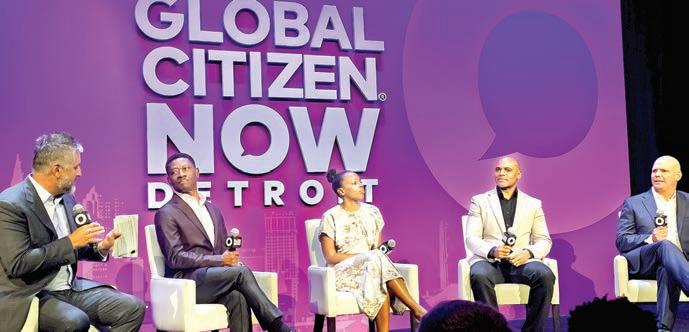
By Miss AJ Williams
From July 22 to 27, the Motor City will once again host Hotter Than July, the longest-running Black-founded and Black-led LGBTQ+ Pride celebration in North America. Organized by LGBT Detroit, the event marks its 30th anniversary this year with a week of community-centered programming rooted in spirituality, political engagement, cultural celebration and holistic wellness.
Founded in 1995 as a response to the silence surrounding Black queer lives during the height of the HIV/AIDS epidemic, Hotter Than July has grown into an institution— offering not just celebration, but critical resources, healing spaces and a legacy of activism.
This year’s theme, “Going Back to Our Roots,” reflects a return to foundational values: community care, cultural expression, and Black queer resilience. The week begins on Tuesday, July 22, with a candlelight vigil at Palmer Park beneath the Blue Spruce Tree—an evening to honor ancestors and lost loved ones, fostering reflection and spiritual grounding.
On Wednesday, July 23, attendees are invited to a historical museum reception and mixer at the Detroit Historical Museum and The Griot Music Lounge—an intergenerational space to celebrate the cultural contributions of Black LGBTQ+ Detroiters. Thursday, July 24, will feature a film festival at the Paul Robeson Theater, curated by INPAQ and Joe Black, centering queer filmmakers and storytelling as acts of resistance.
Friday, July 25, begins with the Annual Gathering and

Mayoral Forum at the University of Michigan Detroit Center, where civic dialogue and community voices intersect with political leadership. That evening, the celebration continues with an opening party at Pandora’s Boxx—an affirming and joy-filled community space.
Saturday, July 26, brings the week’s flagship event: the Palmer Park Picnic. This free, family-friendly event includes DJs, food, community vendors, wellness resources, health screenings, and cultural performances. It’s a powerful expression of love and presence in the heart of the city. The week concludes Sunday, July 27, with a worship service and community brunch hosted by Billionaire Boys Club at One Church Detroit and Phoenix of Detroit, closing out the week with spiritual reflection and fellowship.
For three decades, Hotter Than July has remained deeply embedded in the community it serves. It is more than rain-
The conversation wasn’t limited to rooftops and zoning. Equity means expanding who is seen as valuable. “People are missing out on incredible opportunities,” said one panelist. “People in underserved communities, they eat too. They want quality food, restaurants, and markets. That’s impact and bottom-line investing. When you are excluding underserved communities Black entrepreneurs, you are missing out on so many opportunities. We have to do a lot of reframing around inclusivity and bringing everyone into the work.”
The “Precision Medicine” panel shifted the conversation toward public health. Dr. Stephen W. Durst, Dean of Pharmacy at Ferris State University, emphasized the psychological and structural harm of unequal access: “It’s undeniable that health is fundamentally the most important part of our life. Health has to be our focus. Access has to be assured for everyone. Health care and education is very similar, access is very vital. Access and opportunity. The occurrence of pharmacy deserts is of great concern to me. We have to ensure that people have the expectation to be well. Because underserved people expect to be ill and we have to change that. That’s where access plays a part.”
Dr. Chang, founder and CEO of BAMF Health, put the city at the center of innovation. “We can make innovative precision technology for all people. It should be affordable and accessible and that can happen right here in Detroit.”
The next panel — “Fielding the Future” — focused on Detroit’s young people and the power of affirmation. Patty Graham, President and CEO of Meridian Health of Michigan, reminded the room what real community care looks like. “It’s not just a difference in a moment. It’s a difference in their life. This city has people with fire in their belly and people that care.”
Iman McFarland, President and CEO of 21st Century Expo Group, spoke from experience about creating emotional safety for youth. “It starts with being vulnerable, that’s what kids really resonate with. Kids sharing their hardships and what we as adults have
bow flags and parades—it is a response to exclusion, a celebration of visibility, and a roadmap for wellness.
Black LGBTQ+ people have historically been underrepresented in mainstream Pride movements. Hotter Than July unapologetically centers their narratives and joy. The event offers HIV testing, mental health resources and wellness education, reinforcing that health is a movement priority. Through the mayoral forum and political discussions, it also underscores the urgent civic issues facing Black LGBTQ+ communities. And through music, film, art and ritual, it preserves the cultural richness that defines Detroit’s queer legacy.
This year, organizers will also partner with Motor City Pride to build solidarity across the LGBTQ+ community. A. Nzere Kwabena, an elder and longtime activist, will serve as Grand Marshal of the Pride Parade, representing the intergenerational strength of the movement.
Community members can get involved by attending events, volunteering or donating to sustain Hotter Than July’s work. Financial support ensures continued access to resources, programming and safe spaces throughout the year. Visit lgbtdetroit.org/hotterthanjuly for more information.
As attacks on LGBTQ+ rights and Black communities persist, celebrations like Hotter Than July are not just parties—they are declarations of survival, spaces of healing, and beacons of joy. To mark 30 years of organizing, affirming and celebrating is no small feat. It is a living testament to the strength of Black queer Detroiters and a vision of liberation that continues to blaze forward. Here’s to 30 more.
From page B-1
struggled with. Find the positives and beauty in being unique. With this program we’re trying to empower and give them a framework that they can utilize and to be proud of who they are and that they matter and they’re not alone. We try to meet them where they are. Stay FLY — Fully Love Yourself.”
NFL Hall of Famer Darrell Green put his commitment into a generational context. “I came from food stamps. So, it’s a blessing to be able to share our stories with these kids. Every little boy and girl just wants to be loved and know that someone cares. We’ll travel 1800 miles to give a kid a hug. That’s the key — if we show up, they’ll show up. We have the influence and celebrity, and we’re able to use it to be a benefit to these young people, and it’s so special.” He added, “I’m going to continue to do this until I die. It’s my calling. We can all serve and I truly believe that. And I’m gonna do it until God calls me home.”
Simon Moss returned to announce a major move: a worldwide initiative to bring AI literacy to 10 million people, with a sharp focus on underserved women and children — starting in Detroit. “AI for all will be given worldwide, a global movement,” he said. “Especially here in Detroit.”
The final session on creative economy didn’t feel like a wrap-up. It felt like a passing of the torch — from legends who shaped cultural movements to those still building them here in Detroit. Robin Terry, Chairwoman and CEO of the Motown Museum, spoke to the dual responsibility of honoring legacy while nurturing what’s next. “Motown garnered all types of creatives to convene all for one purpose — to collab and make great music. In our expansion, there’s two parts — that tells the story and history of Motown, and there’s what’s next, telling stories about what’s going on now in the world of music. It’s part of our investment back into the talent of Detroit. There’s no shortage of talent here. We just need to keep creating the spaces for them.”
Ben Blackwell of Third Man Records added to that, saying, “The ultimate Motown model is anyone who has a bare minimum of space, but with that drive and true intention, there’s nothing you can’t do.” His comment echoed what so many Detroiters have always known — that greatness doesn’t come from luxury; it comes from the grind, from the hallway studios, the basement sets, and the backyards turned venues.

The cultural pulse was carried by Sheefy McFly’s live painting performance — a visible declaration of Detroit’s creative heartbeat. “If it wasn’t for art or Detroit I wouldn’t be here today,” McFly said. “Art saved my life. It’s a responsibility to retrace Detroit to Detroiters because we get these big companies that come here and look at us through a fish bowl. There’s an importance and power in our own soil.”
Jessica Care Moore, Detroit Poet Laureate, laid out what makes the city singular. “The soul of our city is the people. Detroit has always been a character in my poems. What’s different about us is that we’re not Brooklyn, Chicago, or LA on purpose. We’re regular kind of folks and geniuses at the same time. If not for us, what is music? Detroiters don’t care about fame, they care about the work.”
Artist Deann Wiley, founder of DeeLaShee Artistry, emphasized presence over legacy. “Legacy isn’t a long-term thing for me. I want the people who see and support me to know that I see them as well. My legacy is to contribute to the right now.”
Global Citizen and Mona Ventures unveiled the Detroit Access to Capital Program — a $1 billion initiative for affordable business loans focused on underestimated entrepreneurs. Mark Cuban, who moderated the discussion, said, “ChatGPT can write a business plan that’s better than anything I could write.” Andrew Leon Hanna, co-founder of Mona University, added, “Access to capital comes down to the heart of it — storytelling. What are the stories that we’re willing to believe touches us?”
Wyclef Jean closed the session as both an artist and Global Citizen Ambassador. He reminded the audience that, for him, this role is not symbolic. It is personal, urgent, and grounded in responsibility. “For me, it’s an amazing platform. Keep in mind I ran for president in my home country, so I do not take this lightly. The Fugees is short for refugees — we’ve always been at the forefront. A kid from my home can look to me and say if Wyclef can do it, I can do it. And that’s the message I will continue to push as ambassador.”
Wyclef’s words hit different in a city like Detroit — a city made up of migrants, survivors, visionaries, and Black working-class families who’ve turned displacement into determination. When he spoke about transforming global access to AI for small businesses, it was more than innovation talk. It was about making sure that the next kid growing up on Linwood or Jefferson knows that their ideas are not too small, not too local, and never out of reach.
Global Citizen’s conference didn’t just land in Detroit — it resonated. It heard what Detroiters have been saying for years: if you want to see the future, don’t just look at federal buildings or boardrooms. Look at neighborhoods. Look at murals. Look at small businesses and spoken word stages. Look at the places that have always known how to rebuild themselves, not out of convenience — but because they had no choice.
This wasn’t a conference about Detroit. This was Detroit standing firm in the face of a world looking for answers. From AI to urban farming, mural work to medical deserts, the summit didn’t just pose questions — it spotlighted the people already doing the work. The people who never left. The ones who knew the city’s value long before the cameras arrived.
Ebony JJ Curry can be reached at ecurry@ michronicle.com.
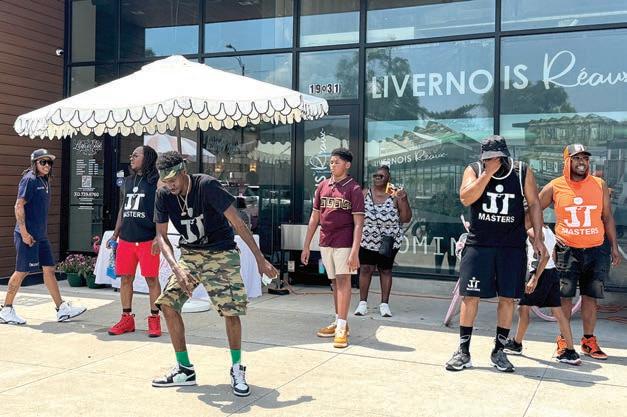
From page B-1 Life is full of ups and downs. But together, we can overcome any obstacle. Rise to any challenge. And fight any battle.
as attendees passed by. Perkins told the Michigan Chronicle Saturday that the activation of the block is exactly what many mayoral candidates and candidates for city council say they want in more neighborhoods.
The problem we see with this area and many others that aren’t planned for a heavy pedestrian presence but have potential for them is parking is not conducive to business. If we were to plan for these corridors to take on this much activity, we would see angled parking like we do in Ferndale or Birmingham.”
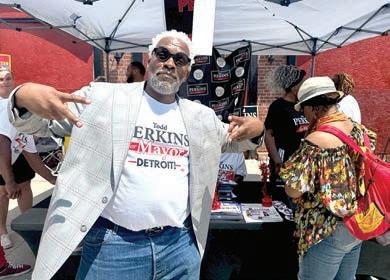
“This is what the goal is,” Perkins said. “This is no different than Grand River; this is no different than parts of Woodward, Gratiot, Kercheval, all of those streets. Even when you go far west, Fenkell, Puritan, there’s so much opportunity for investment. All you got to do is put a shovel in the ground, and we need to do it before somebody else comes in and does it. The people who are here and were here first should be able to enjoy it the most.
Candidates for city council were also present, including state Rep. Helena Scott, who is running against incumbent councilwoman Angela Whitfield Calloway, and former councilman Roy McCallister Jr., who also had a presence at the event. The Avenue of Fashion is located within District 2.
At-large candidate Detroit fire chief James Harris was also talking to voters on Livernois Saturday. He is challenging Mary Waters and Coleman Young II for one of two at-large seats. Instead of choosing sides, businesses like Times Square Men’s Clothing,
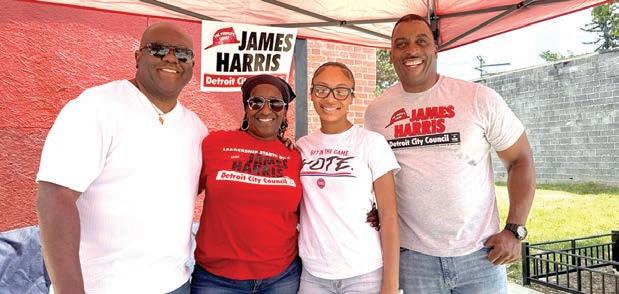

By Jeremy Allen
EXECUTIVE EDITOR
After decades of dedicated service to the Detroit faith community, Rev. Dr. Mickarl D. Thomas, Sr. will be honored in a special two-day celebration hosted by the Historic Ebenezer African Methodist Episcopal Church. The events, set for August 8 and 10, will pay tribute to Dr. Thomas’s profound spiritual leadership, unwavering commitment to ministry, and transformative impact on the lives of many throughout the city and beyond.
Dr. Thomas, who has long served as a guiding light within the African Methodist Episcopal (AME) tradition, will retire from public ministry later this year. Known for his powerful preaching, compassionate service, and deep connection to the people he has served, Dr. Thomas leaves behind a legacy rooted in faith, fellowship, and tireless devotion to his congregation.
A Celebration of Spirit and Sound
The first of two events will be held on Friday, August 8, 2025, at 6:30 PM, at Ebenezer AME Church, located at 5151 W. Chicago Blvd., Detroit, MI 48204. Titled “A
Soulful Spirited Celebration! Jesus & Jazz,” the evening will blend the elegance of live jazz with heartfelt tributes from friends, family, church members, and community leaders.
Attendees can expect a festive atmosphere filled with reflection, joy, and powerful musical performances—all honoring Dr. Thomas’s enduring influence. This retirement dinner aims not only to celebrate a distinguished ministry but also to gather those touched by his leadership for an evening of unity, gratitude, and spiritual uplift. Worship and Witness: A Spiritual Sendoff
The celebration continues on Sunday, August 10, 2025, at 10:00 AM, with a Retirement Worship Service at Ebenezer AME Church. This service will be the spiritual culmination of Dr. Thomas’s remarkable pastoral journey.
Delivering the keynote sermon will be Rev. David Byron Cousin of the Historic Bridge Street AME Church in Brooklyn, New York. A powerful voice within the AME Church, Rev. Cousin, will help lead the congregation in a morning of worship, celebration, and thanksgiving. The service will include gospel music, scripture, and
By Jeremy Allen
EXECUTIVE EDITOR
Oakland County will mark a milestone in civil rights history with a public celebration of the 35th anniversary of the Americans with Disabilities Act from 11 a.m. to 2 p.m. on Thursday, July 24, at the Oakland County Circuit Court Courtyard. The event aims to honor the ADA’s legacy, celebrate community members with disabilities, and reaffirm the county’s commitment to inclusion and access.
Signed into law in 1990, the ADA outlawed discrimination against individuals with physical, mental, and cognitive disabilities in employment, public accommodations, transportation, government services, and more. It was a transformative moment for all people with disabilities— and particularly for Black Americans, who are disproportionately impacted by disabling conditions like diabetes, and often face intersecting barriers to healthcare, employment, and social mobility.
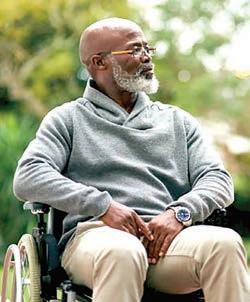
“The Americans with Disabilities Act was a transformative moment in our nation’s history and Oakland County remains committed to upholding its spirit and intent,” said Oakland County Executive Dave Coulter. “This event honors the strength and contributions of the disability community and reaffirms our pledge to equity and access for everyone.”
Black communities experience higher rates of chronic illness, including diabetes, a leading cause of disability. According to the CDC, Black adults are nearly twice as likely as white adults to be diagnosed with diabetes, which can lead to complications such as amputations, vision loss, and mobility challenges. For many, the ADA represents a vital shield against systemic inequities that have long gone unaddressed.
At the celebration, Coulter will be joined by several notable advocates and community leaders, including keynote speaker Erica Coulston, co-founder of Walk The Line Recovery Therapy; emcee Sam Jenkins of Empowering Communities w. Sam Jenkins; and Oakland County’s Chief Diversity, Equity & Inclusion Officer Harry Weaver. Weaver, a respected voice in the DEI space for more than two decades, brings a personal and professional lens to the event. His career includes roles at Chippewa Valley School District, the Anti-Defamation League, and as an independent consultant focused on inclusive practices.
“The ADA laid the foundation for making America more accessible to individuals who live with disabilities, like me,” said Weaver. “As we mark 35 years, we need to continue to create spaces where people of all abilities are respected, empowered and included.”
Coulston, who sustained a C6/7 spinal cord injury in 2001 at just 23 years old, leads Walk The Line using principles of neuroplasticity to offer rehabilitation across a wide range of diagnoses. Her advocacy underscores the ongoing need for vigilance in protecting the rights guaranteed by the ADA.
“This year as we celebrate the 35th Anniversary of the Americans with Disabilities Act, which was enacted to prohibit discrimination based on disability and guarantees equal access for people with disabilities, we are reminded of the need to remain vigilant in protecting these rights,” said Coulston. “With crucial government programs in jeopardy, the disabled community calls on our neighbors, local businesses and government officials to protect our right to equal access. The time is now for us to unify our voices to celebrate and safeguard this essential law — The ADA.”
Oakland County Parks Recreation Program Supervisor Sandy Dorey emphasized the personal power behind the speakers’ messages.
“Our speakers are very passionate about protecting the rights of individuals with disabilities and they have many lived experiences to share,” Dorey said. “Their personal stories are compelling and will demonstrate ways that all of us can help support inclusivity for everyone.”
The ADA Celebration Event will include inclusive and adaptive sports demonstrations, yard games designed for all ages and abilities, food trucks, and meet-and-greets with local organizations that serve the disability community.
The county’s Adaptive Recreation program will also be featured, showcasing year-round offerings such as social events for individuals with developmental and intellectual disabilities, sports for people with physical disabilities, and signature events like Disability Dirt Day—where participants enjoy off-road adventures at Holly Oaks ORV Park— and Dreams and Wings, which offers airplane rides.
The 35th anniversary of the ADA is moment to reflect on how far society has come and how far it still has to go, particularly for Black communities that remain at the intersection of disability, economic inequality, and health disparities.
For more information about the ADA Celebration Event, visit OaklandCountyParks.com.
personal tributes, offering a sacred space for the community to express their love and appreciation for Dr. Thomas’s decades of service.
A Legacy Rooted in Faith and Community
Throughout his ministry, Reverend Dr. Mickarl D. Thomas Sr. has been more than a spiritual leader—he has been a mentor, a community advocate, and a voice for justice and compassion. Under his leadership, Ebenezer AME Church continued its 150year legacy as a hub for spiritual growth, education, and civic engagement in Detroit.
Founded in 1871, Ebenezer AME Church has long been a cornerstone of the city’s religious and cultural fabric. From hosting youth outreach initiatives to supporting families in times of need, the church has remained committed to uplifting its community. Dr. Thomas has played a pivotal role in advancing that mission, shepherding the church through seasons of change while holding steadfast to its foundational values. An Invitation to the Community
Both the retirement dinner and the worship service are open to the public, and the church warmly invites members of the Detroit community to participate in this mile-
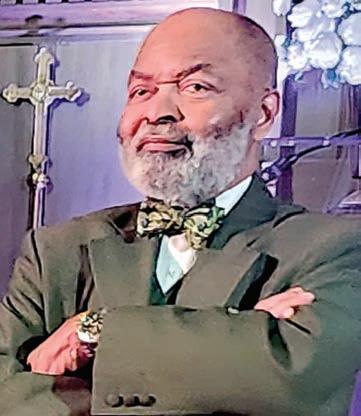
stone celebration. Tickets for the retirement dinner are available now, and RSVPs are encouraged for all planning to attend.
For tickets or more information, please contact Ebenezer African Methodist Episcopal Church at 313.933.6943 or ebename@ sbcglobal.net.
As Detroit prepares to honor one of its most beloved spiritual leaders, the legacy of Reverend
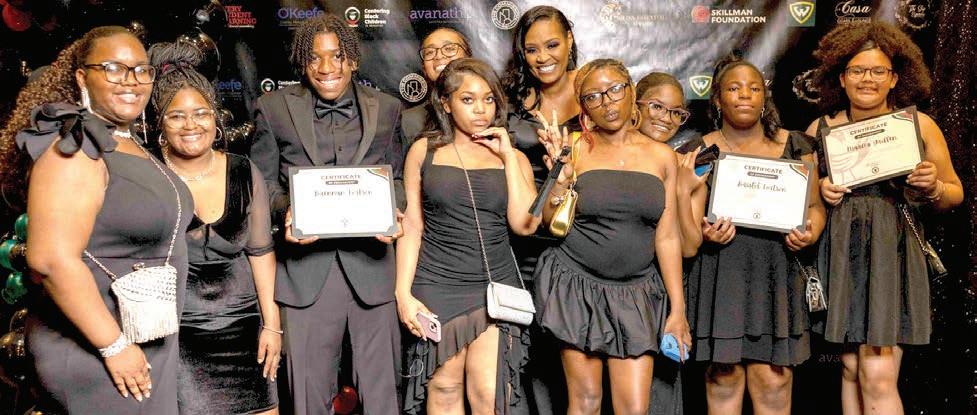
By Jeremy Allen EXECUTIVE EDITOR
The second annual Shades of Black Ball made a powerful return to Detroit on June 20, bringing together a vibrant community of leaders, students, and allies committed to making a difference in the lives of Black students. Hosted at The Garden Theater, the event raised critical funds and provided 42 scholarships in one night, reaffirming the collective’s mission of empowering Black students through education, leadership development, and community-based research.
The event, organized by the Sankofa Scholarship Collective, was not just a celebration but a call to action. With 32 middle and high school students from Detroit and 10 doctoral fellows from across the nation receiving scholarships, the Ball provided immediate support to a diverse group of young scholars. Yet, its impact went beyond the financial contribution. The Shades of Black Ball symbolizes the Collective’s ongoing work to eliminate barriers for Black students and to create an educational environment where their brilliance is nurtured and celebrated. Challenging Harmful Narratives
This year’s theme, “Not Like Us,” spoke directly to the harmful stereotypes and limiting narratives often placed on Black students. Instead of reinforcing these damaging tropes, the evening turned the spotlight on the brilliance, creativity, and leadership potential within the Black community. Dr. Rema Reynolds Vassar, the founder of the Sankofa Scholarship Collective, shared the importance of standing up for Black students beyond the one-night celebration.
of Griffin’s piece, “Story of Life by a Young Black Girl,” earned her a standing ovation and served as a poignant reminder of the resilience and creativity of young Black voices. Griffin’s poem, which explored the challenges and triumphs of growing up as a Black girl in America, encapsulated the evening’s central themes of empowerment, self-expression, and healing.
The night was also filled with moments of pure Black joy—laughter, line dancing, and the kind of connection that only comes when people come together with a shared purpose. There was a palpable sense of celebration as attendees honored the achievements of the scholarship recipients and their families. For many, the Ball was not just an event but a moment to reflect on the legacy of Black excellence, leadership, and resilience.
Sankofa Scholarship Collective: A Movement, Not Just an Event
Though the Ball itself was a singular event, the work of the Sankofa Scholarship Collective continues year-round. Dr. Vassar and her team are unwavering in their commitment to funding the futures of Black students and dismantling the barriers that so often hinder their academic success. The Collective focuses on creating pathways for Black students to access higher education, build leadership skills, and engage in community-rooted research that addresses the issues most relevant to their lives.

“We didn’t just celebrate our students, we stood in the gap for them,” Dr. Vassar said. “The need doesn’t end when the music stops. We must keep showing up, funding futures, and fighting for the education our students deserve.” This statement encapsulated the spirit of the event: a collective effort to break down educational barriers and ensure that Black students are given the resources they need to thrive.
Dr. Vassar’s words reflect her deep commitment to scholarship and education—a passion that has been evident throughout her career. Over the years, Dr. Vassar has established herself as an advocate for education equity, focusing on the systemic challenges that often impede Black students’ access to quality education. Her work through the Sankofa Scholarship Collective, a nonprofit organization she founded, has provided countless opportunities for underrepresented students, especially in the Detroit area. Through the Ball, Dr. Vassar and her team continue to provide life-changing support to students in need, ensuring they have the resources and mentorship to succeed both academically and professionally. Moments of Black Joy and Celebration
The evening was filled with powerful moments that showcased the rich tapestry of Black culture, strength, and joy. One of the most moving moments came from the Vantablack Keynote Speaker, Rev. Dr. Wendell Anthony, President of the Detroit Branch of the NAACP—the largest branch in the nation. Revered for his activism and leadership, Dr. Anthony was also honored with the Sankofa Award, which recognizes those who have demonstrated an unwavering commitment to the Black community.
In his address, Dr. Anthony captured the essence of the night with his impassioned words: “Black is too wide to get around it, too tall to climb over it, too deep to get under it, too tough to pass through it—so you might as well just accept it…will you stand in the shade?” His words resonated with the crowd, serving as both a celebration of Black identity and a challenge to those in attendance to stand in solidarity with Black students and their futures.
In addition to Dr. Anthony’s stirring speech, the night featured a number of other unforgettable moments, including a show-stopping spoken word performance by Sankofa student Zyaire Griffin. The raw power and emotion
The Sankofa Scholarship Collective is also dedicated to providing opportunities for Black students to engage with mentors, industry professionals, and community leaders who can offer guidance and support as they navigate the often-complex terrain of higher education. Through the Sankofa Research Intensive, doctoral fellows from across the country gain access to cutting-edge academic resources while building a network of scholars who are committed to advancing social justice and educational equity.
For many of the students and fellows who received scholarships at the Ball, the funding provided not only alleviates the financial burden of education but also acts as a symbol of belief in their potential. “This scholarship is a vote of confidence in me and my future,” one recipient shared. “It shows that people see me for my brilliance and not just the limitations others might place on me.” Ongoing Support and the Road Ahead
As the Ball came to a close, it became clear that the work was far from over. The event raised significant funds, but it also raised awareness of the ongoing need for investment in Black students’ futures. The Sankofa Scholarship Collective, though incredibly impactful, relies on sustained support from its community of sponsors, donors, and volunteers.
The sponsors for this year’s event included notable organizations such as Centering Black Children in Education, Wayne State University, The Skillman Foundation, and The Commission REI, among others. Their contributions are critical to the Collective’s ability to continue its work and provide scholarships, leadership opportunities, and academic support to Black students across the nation.
As Dr. Vassar emphasized, the mission of the Sankofa Scholarship Collective goes beyond one night of celebration. “We are not just funding scholarships; we are funding futures,” she said. “This is about creating lasting change, and that requires all of us to stay committed to this cause.”
For the students who received scholarships, the Shades of Black Ball was just the beginning of their journey. For Dr. Vassar and the Sankofa Scholarship Collective, the work continues—grounded in the belief that Black students deserve more than just an education. They deserve the opportunity to lead, to innovate, and to create the change they wish to see in the world.
The next Shades of Black Ball will be an even greater celebration of Black excellence, but until then, the movement for Black education continues, fueled by the unwavering commitment of the Sankofa community.

November 7, 2022.
A pre-bid site visit will be determined at a later date, if necessary. Proposals can be accessed on the Bidnet Direct www.bidnetdirect.com//detroit-transportation-corporation



Mike Anderson Procurement Manager mandersonjr@thepeoplemover.com
certification to indicate that the social media influencer has formal financial planning education and experience.
Guaranteed returns: Offers that sound too good to be true typically are. Be wary of “no risk, high reward” claims.
Detroit People Mover/Detroit Transportation Corporation 535 Griswold St Ste # 400 Detroit, MI 48226
BID # 08-8-2022 REBID
Pressure: Applying pressure on viewers to act fast could be a sign that you’re watching a scam artist. CFP® professionals can work with you to plan years and even decades ahead, on goals such as retirement or buying a home. Financial planning can take time.
The Detroit Transportation Corporation Office of Contracting and Procurement requests proposals from qualified Contrac tor/Firm(s) to provide annual geometry measurements of the LIM rail height, power rail tolerances, running rail height and track gauge.

Sensational language: Is a financial influencer, or “finfluencer,” dismissing traditional retirement accounts as obsolete? Advising that you tie up all your assets in real estate? Be suspicious of bold claims challenging prevailing financial wisdom. It’s important to remember that many influencers operate with one goal in mind: getting views, likes, comments and
The initial information and subsequent trending information on the rate of change of the measured parameters of the Detroit People Mover (DPM) track will be reviewed and utilized as part of the existing detailed maintenance plan to ensure long term safety and availability to the riding public.
All bids must be received by the Detroit Transportation Corporation via Bidnet/MITN on or before 5:00 p.m. (EST) November 7, 2022. A pre-bid site visit is scheduled for Wednesday, October 25, 2022 at 10:00 a.m. (EST). Proposals can be accessed on the Bidnet Direct www.bidnetdirect.com//detroit-transportation-corporation
Mike Anderson Procurement Manager mandersonjr@thepeoplemover.com
AToday, many small business owners understand the power of offering a retirement plan, such as a 401(k), to attract and retain top talent and provide additional financial security for their employees. In fact, a retirement plan is the benefit most wanted by workers after health insurance, according to a survey commissioned by 401(k) provider Human Interest.
Many states have passed or enacted laws requiring most employers to offer retirement plans for employees. Currently, 20 states have passed legislation for statemandated retirement programs and 13 states have active programs. Legislation is currently being considered in an additional 28 states.
Senior Digital Sculptor Warren, MI, General Motors. Plan &perform advanced surfacing concepts &development of Class A surface of full vehicle exterior syss. Interpret &define design intent of designer while collaborating w/ engineering, packaging, human factors, &tooling teams. Design &develop 3D Class A surfaces of ICE, diesel, BEV &AV full vehicle psgr car, truck &SUV exterior cmpnts incl. front &rear fascias, grills, head/taillamps, doors, fenders, ABCD pillars, skid plates, liftgates, truck beds &detailed exterior cmpnts incl. door handles, mirrors, lamp internals &exhaust tips, using Autodesk Alias AutoStudio, Autodesk Maya, NX &VRED tools, for U.S., global &emerging markets. Interpret, define, conceptualize &execute unique solutions to technical challenges &provide creative proposals to capture design intent from initial concept thru mass production achieved in various stages according to GVDP, while collaborating with engrg, packaging, human factors, &tooling teams to assure minimum radii/draft, tooling &safety reqrmnts in compliance w/ U.S., European &China standards. Bachelor, Transportation or Industrial Design. 60 mos exp as Digital Sculptor, Digital Modeler, or
Employers can opt out of state-mandated retirement programs by offering a 401(k) plan, simplifying compliance for business owners. Federal regulations, such as SECURE 2.0, introduced incentives and requirements for business owners who offer 401(k)s, which make it easier for employees to save and access their funds.
If you’re a small business owner setting up a retirement plan, these considerations can simplify the process while helping employees save for retirement.
Add Auto-Enroll to Your 401(k) Plan
Many people intend to save for retirement, but don’t take the necessary steps to enroll in a plan. Plans that include an automatic enrollment feature help overcome this inertia by automatically collecting deferrals from

of BEV system &cmpnt level SW for electrical validation of VMEC &AS syss incl. Long/Short Range Radars, Rear Vision/360/Driver monitoring cameras, antennas, Body & Vehicle Integration Control Modules, &features incl. Adaptive Cruise Control, Lane Keep Assist, Autonomous Driving Features, Emergency Braking, Collision Mitigation, Alerts, &related module &feature validation status plans for vehicle prgrms, using PQMS, NX, vSpy, Teamcenter (Tc), &ECM tools. Perform on time SW &HW validation of embedded module ECUs, thru design/production/SW iteration validations. Bachelor, Electrical, Computer, Mechatronics, or Mechanical
employees’ compensation each pay period unless they opt out of participation.
SECURE 2.0 mandates auto-enroll for most 401(k) plans established after Dec. 29, 2022. If your plan is not subject to the requirement, consider adding it voluntarily. Ultimately, auto-enroll can help contribute

“free” money. In addition, employers can take a tax deduction for their matching contributions, up to 25% of the total compensation paid to eligible employees for the year.
SECURE 2.0 also introduced a tax credit for matching contributions for small employers with new plans. Employers should be aware the tax credit is an alternative to the deduction; the employer can’t claim both in the same year.
Pick a Platform Designed for Small Businesses
The administrative burden of setting up retirement plans can be overwhelming for some business owners. Choosing a techenabled 401(k) platform like Human Interest – which offers a fast online setup in a few clicks; transparent pricing; and attentive, human support – can help employers navigate the shifting landscape of statespecific regulations and mandates.
When choosing a provider, also consider the upfront fees you’ll pay (both as an employer and for the employees participating in the plan), if the platform integrates with your payroll provider, customer service response times and how the 401(k) provider can help answer questions about compliance from regulatory bodies to set your employees up for long-term success.
Find additional information to help provide a more secure financial future for your employees at humaninterest.com.























